Tyre Nichols: another innocent Black man’s life stolen
Tyre Nichols, a young father with a four-yearold son, was brutally beaten to death by five police officers at a traffic stop in Memphis, Tennesse on Jan. 7. After three days in the hospital, he passed away on Jan.10 from critical injuries including severe internal bleeding. The incident started when he was pulled over for alleged reckless driving as a motorist, although he had never been in trouble with the law before. Police detained Nichols after a confrontation took place where he attempted to run away from the officers. When they apprehended him, the five men physically beat Nichols by using batons and pepper spray until he screamed for his mother.
Nichols was 29 years old when the attack took place. His family described him as a loving young man who was creative, loved sunsets, and skateboarding. On weekends he would go to the city park, and wait for the sun to set so he could capture a photo. He was on his way home to the house he shared with his mother and stepfather when he was stopped and assaulted. Nichols was the youngest of his family by twelve years, but still incredibly close to them, as he had his mother’s name tattooed on his arm.
Before the confrontation became violent, the officers demanded Nichols lie on the ground,
while two of the men constrained his arms. They were screaming tasks such as to “lie down” but he couldn’t comply because the officers were holding him up straight. They proceeded to spray him with an irritant, and when Tyre was released for a brief second he ran from the tasers that were firing at him. The five officers caught up to Nichols while he was less than eighty yards from his home.
The ambulance took twenty-two minutes to arrive while Nichols was left leaning against the police car. From the footage, it
26th, all five police officers were charged with second-degree murder, meaning that the killing was not premeditated. The district attorney brought charges against the men within twenty days, making sure they are held accountable.
Nichols' story has raised national attention quickly due to the brutality and nature of the case. His mother, RowVaughn Wells, put together a fundraiser for his memorial service with the initial goal of $10,000, but it has surpassed over $1 million dollars in two days. The goal was to raise money for mental health services and a memorial skate park.
Masters held a vigil to honor Nichols at the labyrinth in front of Estherwood on Jan.31st. Students and faculty gathered around the labyrinth, holding candles, while words of sorrow were spoken.

Zahali Vauclena, senior co-chair, spoke about his reaction to the vigil and the support of the community members.
rounded our country. He reiterated how important it is to be aware of the ongoing issue. “I think having that sense of awareness, about the issue of violence that is perpetrated against brown and Black bodies, and not walking through the world with blinders on if you’re privi -
leged enough to not have to worry about that sort of thing,” he said.
In order to encourage one another to be hopeful despite the difficulty, Davis mentioned how imperative it is to show commitment and support. “What keeps me hopeful is seeing some of the young
Black men in this community, and other communities around me, walk with their heads held high. They know they have a place in this society and that they are going to achieve great things,” he said.
was clear that the paramedics were indifferent to Nichols' injuries, as they were chatting with the officers. He was then taken to St.Francis Hospital which was a fifteen-minute drive from his current location.
Tadarrius Bean, Demetrius Haley, Emmitt Martin III, Desmond Mills Jr. and Justin Smith were fired after the investigation team found they had violated department conduct by using extreme force. On Thursday, Jan
“Growing up as a Black man, there’s a lot of mistrust with the government and policing. But just having this support system, with people you can trust, that acknowledge what is going on in the world, is so important,” he said.
Vauclena also shared his hopes for the future: to live in a world where future generations don’t have to deal with injustice. “Being a power for good is what I strive for, and it’s what everyone should strive for in their community,” he said.
Roland Davis, associate head of diversity, equity, and inclusion (DEI) commented on his dismay about the violence that has sur -
China’s borders reopen after covid surge
After nearly three years of closed borders under the “Zero-COVID” policy, China loosened travel restrictions on Jan.8. The policy, which has kept China’s 1.4 billion people within the nation, was altered last December in response to protests against strict quarantine regulations. Now, the government has dropped the quarantine requirements, and is allowing those traveling to the country to enter without a required quarantine. This has allowed Chinese citizens to travel outside the country for the first time since the start of the pandemic without the worry of the restrictions they would face upon return.

Sophomore Eunice Wang, an international student from China, had been previously affected by the travel restrictions. She said, “I haven’t been home for a year and a half and then this opening up of the borders makes me want to go back to China during spring break.” Wang had planned to travel back to China the past summer, however, her flight was canceled due to border restrictions. “I had to remake my plans and find somewhere else to go for the whole summer. Because of the border restrictions, every single break I have had to find somewhere else to go, like a host family,” she said.
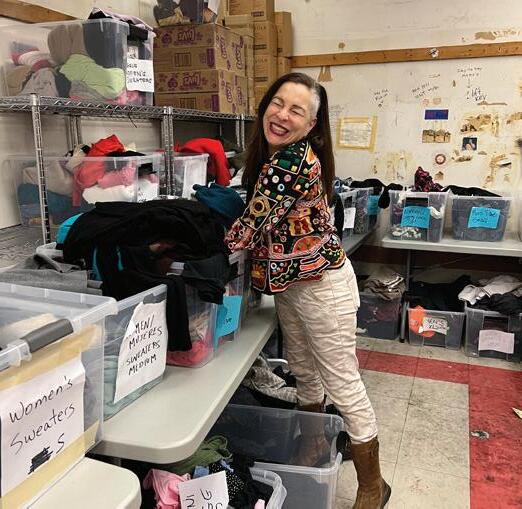
Now, Wang is planning her spring break at home with her mother. She said, “Me and my mom are looking at plane tickets already because with the opening of the border, the plane ticket prices also went down a lot. So my mom was like, ‘You should just come back to China after a year and a half in America.”
Many companies, such as Singapore Airlines, have reinstated flight routes to China for the first time since the start of the pandemic. Pent up demand for travel in China has been building up for the past years, and, despite the economic low the nation has been experiencing due to the pandemic, will provide many business opportunities in the tourism industries worldwide.
However, this abrupt reopen-
ing has also raised international concern as nations worry about the surge of Covid cases in China. Over 20 countries now require negative COVID-19 tests from travelers from China. In the span of the last months, Covid cases within China have rocketed from nearly zero to millions. However, because of the suddenness of this rise and the lack of transparency with China’s internal research
work, there have only been speculations and predictions regarding the cause of this speedy rise in cases. One plausible explanation is the strength of China’s Covid vaccines.
Nitin Gupta, school doctor, said, “China didn't use the mRNA vaccines. They're using Sinovac’s, which is based on a traditional vectorbase vaccine but may not have been as effective or as up to date with the current strain the
Americans and so that may have led to the rise of the cases but also wasn't just a gradual easing into.
Yeah, it was just all of a sudden.”
There is also concern regarding Masters boarders from China.
“My biggest concern is our Chinese boarders, and I know many are eager to go back home.
I'm checking every day and hoping and crossing my fingers that the situation in China is getting


better so that our kids can go back home. It looks like they've rounded the corner in China,” said Gupta.
Senior Youri Lee is an international student from South Korea, which currently requires a Covid test from China travelers before and after entering the country.
Lee said, “As a Korean citizen, having the influx of so many travelers at once, our country is not capable of holding it. Especially with the amount of Covid patients coming into our country, it is very hard for Korea to deal with.”
Many nations, including the U.S., are also worried about a lack of transparency from the Chinese government in terms of the virus’s statistics in China. One big question which was widely circulated when cases first rose in China was: “is there a new variant?” Now, after observing the trend and collecting data through requiring COVID-19 tests in travel, the answer to that question is cautiously optimistic.

Gupta said, “Travel has reopened and we haven't seen anything too concerning yet. So that's a good sign. I think hospitalization is decreasing. It's still pretty bad over there, but I think it's decreasing. I'm hopeful that our kids can go back to visit their families.”
As China and the rest of the world continue to navigate the new surge in cases and its subsequent opening of borders, much of the future of the pandemic is still up in the air. However, amidst the tragedy Covid is bringing to Chinese families, and the concern with statistics around the globe, Gupta said that a future in which the pandemic will no longer be a big concern may be in sight. “I think we'll know in the next four weeks. If China continues to improve, I think we're in good shape,” he said.

VOLUME 79, NUMBER 3 February 3, 2023 TOWER The Masters School 49 Clinton Avenue Dobbs
N.Y. 10522 XAVIER ROLSTON/TOWER
Ferry,
@masterstower Lead News
STUDENTS AND FACULTY GATHER in front of Estherwood to honor the life of Tyre Nichols. Laura Danforth, Peter Newcomb, and Roland Davis lead the vigil by exchanging words of sorrow .
Editor Gisele Cestaro
“ What keeps me hopeful is seeing some of the young Black men in this community, and other communities around me, walk with their heads held high. They know they have a place in this society and that they are going to achieve great things.”
- Roland Davis
Maia Barantsevitch and Ellie Yang Editors-in-chief
CHINA’S BORDERS HAVE OPENED after 3 years of travel restriction due to Covid, which has impeded the ability to leave the country without quarantining upon return. Now citizens of China can travel outside the country without fear of long isolation periods upon return. Scan to read more at Tower.Mastersny.org! Read more about Asylum Seekers in New York City Page 11
CHANA KIM/TOWER
US weather becomes less predictable The conversation about climate change heats up
New Yorkers this winter have flip-flopped in between their heavy winter coats and light fall jackets. The weird weather in 2023 was kicked off on Jan. 4th when New York experienced a high of 61 degrees Fahrenheit. This highly uncharacteristic winter weather was 25 degrees higher than the average high of 36 degrees in January and the cold white Christmas of 2022 with a low of 14 degrees.
This epidemic of unnatural weather has not only affected the East Coast. Currently in California, the La Niña weather event has been the cause of 17 deaths. This La Niña has
brought an excess of the previously much-needed water after one of the driest years in California.
This shocking winter warmth has been exaggerated and brought upon by climate change. Climate change’s effects which include the warming of the Earth, underlie the recent bout of unusual weather. Climate change means that not only is the earth warming - but it also means that we should expect extreme weather events, including hurricanes and tornadoes, to become more common.
California’s La Niña is a prime example of an extreme weather event driven by climate change. La Niña occurs when the Pacific Ocean is in a cycle of cooling, which leads to various weather effects for both the US and countries in and surrounding the Pacific. It is common for La Niña to return on
a 3-5 year basis with a possibility of lasting more than one year. But, this La Niña season has lasted longer than most of the previous ones - a total of three years. Furthermore, this event has created uncommon weather conditions. La Niñas are usually characterized by their drier conditions than its opposite weather phenomenon, El Niño, which oc -
curs every 2-7 years. This year, however, La Niña has taken on
Seven counties in Georgia have been declared major disaster ar -
and how climate will impact it.
“It definitely makes me think about the future for me and my peers and how it really feels like this is going to be more and more of a problem until action is taken,” Freund said.
Teacher and club advisor for EFFECT, Courtney White believes that amongst an assortment of solutions careful monitoring and reduction of CO2 emissions, one of the harmful greenhouse gasses leading to climate change, is essential to our survival as a species.
a new personality and dumped unprecedented rivers of rain up and down the California coast.

Climate change effects are also hitting the southeast as tornados have ravaged towns in states such as Alabama and Georgia.
eas and according to the National Weather Service, 13 tornadoes have touched down in Alabama.
Paige Freund ‘24, a member of Masters’ sustainability club EFFECT, expresses her concerns for the future
“We have to be proactive in reducing our CO2 or else it won’t be a choice for us.”
Masters alumnus running for the Ithaca Common Council
Ithaca Common Council, which includes ten members, is effectively the City Council in Ward
certainly fits within his academic goals. It doesnt surprise me.”
Clyde Lederman, a Masters class of 2022 alumnus, is running for the Ithaca Common Council. He kicked off this campaign in his hometown of Nyack with a gathering on Sunday, Jan. 8. Lederman is a fourth-generation union member, who now attends Cornell University. His campaign email said, “[I have]the intention of studying labor relations to carry forward the legacy of speaking up for a world where the people hold the power.”
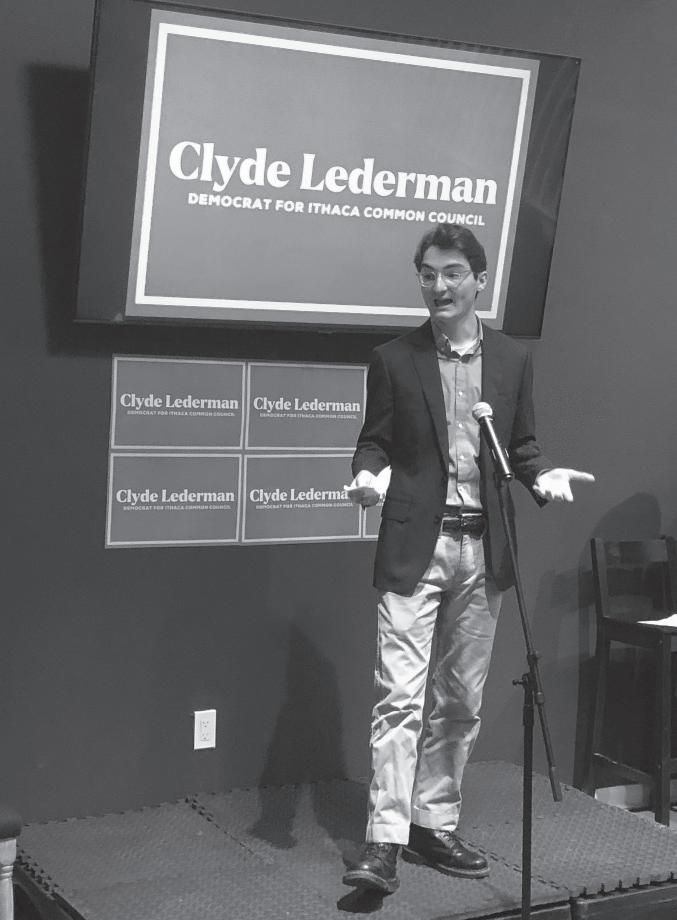
Lederman has two major goals: affordable housing and reliable transportation. There is a general election in November, which is historically uncontested. The most important election for Lederman is the Democratic primary on June 27, 2023.
“With the creation of a district composed almost entirely of Cornell students, I now have a chance to advocate on the Common Council for their right to stable housing and quality public transportation, the same issues I have spent so much time working on downstate. My commitment to a more just world holds strong because public service does not stop at the county line,” his email read.
5. Lederman will have the opportunity to draft legislation, local ordinances that regulate local government and make decisions on city policy. He will also have the opportunity to serve as a liaison to various city committees and organizations.
Mondaire Jones, former U.S. representative from Rockland Country, made a Zoom appearance at Lederman’s campaign kick-off. “He was a guest at the event. I am very grateful for his support” Lederman said.
Lederman affirmed that Masters “certainly” played a role in the development of his interest in politics. “There are a number of wonderful teachers who encourage involvement and critical thinking about our government and what role it should play in our lives.” He mentioned a number of teachers who affected his interests during his time at Masters, “Matt Ives, Eric Shapiro, Colleen Roche, Skeffington Young, were all very influential in shaping my thinking.”
Eric Shapiro, a Masters teacher who works in the History and Religion depart said, “His campaign
Lederman was a student in Shapiro’s sophmore year, World History II, and in his senior year, AP Euro. “He came in with a keen interest in politics. He and I talked a good deal about what was happening in our country. I like to think I supported him in his political interests,” said Shapiro, “We would have a lot of conversations, in and out of class, about politics. I like to think I supported him in his political interests.”
Having been a member of the Masters community for 17 years, Shapiro said, “I like to see students, everybody, involved in politics.”
Lederman said he also made meaningful connections within the student body. He mentioned his friends Henry Williams and Elijah Emery, who are also Masters alumni. Emery is even working with Lederman as treasurer of his campaign.
Lederman said, “Masters is where I got my feet wet in terms of political involvement. I’m very grateful for them and still have relationships with them. They continue to be supportive of this effort.”
TOWER
3. 2023 NEWS 2
/FEB
CLYDE LEDERMAN SPEAKS AT a fundraiser for his newly launched campaign for Ithaca Common Council. The fundraiser, held in Lederman’s hometown of Nyack, was attended by local and national politicians such as former U.S. Representative Mondaire Jones. It took place in the afternoon of January 8, and raised money for Lederman’s growing campaign.
PEOPLE EXPERIENCE THE BEACH in Amagansett, NY, in December 2022. Long-term climate change is already leading to consequences. Much of the country and the world have been experiencing unprecedentedly warm and generally unpredictable winters.
It definitely makes me think about the future for me and my peers and how it really feels like this is going to be more and more of a problem until action is taken.”
“ MATT IVES/TOWER
- Paige Freund ‘24
Features Editor
TARA PHILLIPS
“
He came in with a keen interest in politics. He and I talked a good deal about what was happening in our country. I like to think I supported him in his political interests.”
IVES/TOWER
-
Eric Shapiro, History teacher
MATT
Lead Features Editor
LUCAS SEGUINOT
FTX fallout brings chaos to crypto exchange
FTX, short for “Futures Exchange,” was once the fourth-largest cryptocurrency exchange in the world. However, it recently declared bankruptcy and was accused of misleading business practices by the Federal Trade Commission, which sent shockwaves through the cryptocurrency world.
Sam Bankman-Fried and Gary Wang founded the FTX cryptocurrency exchange in May 2019. In July 2021, FTX raised $900 million at an $18 billion valuation from over 60 investors. In the three years since its inception, Sam Bankman-Fried has turned the exchange into a $32 billion company, doubling its initial valuation and raising $400 million in funding in January 2022. They expanded their range to include prediction markets, leveraged tokens, tokenized stocks, volatility products, crypto derivatives, OTC, and pre-IPO tokenized stocks. The token created by FTX, known as FTT, started trading below $4 in December 2020 and surged to a high of $85 in December 2021.
In November 2022, information was made public regarding the fnances of Alameda Research (the trading frm founded by Bankman-Fried) and their connections to the FTX exchange. Reports suggested that a signifcant portion of Alameda’s assets were held in FTT,
leading to speculation that the two frms were too closely linked and could violate U.S. regulations. On November 6, Changpeng Zhao, the CEO of Binance (the largest cryptocurrency exchange in the world) announced that the exchange would sell all of its signifcant holdings of FTT. FifteenW minutes later, the CEO of Alameda Research, Caroline Ellison, responded that her frm would buy the tokens from Binance for $22 each. This announcement caused the value of FTT to drop signifcantly; by November 8, it had fallen to less than $6.
On the same day, Zhao announced that Binance had agreed to buy FTX, pending a check of the exchange’s fnances as part of “due diligence.” On November 9, Bloomberg reported that U.S. federal agencies were investigating FTX, and the same day, Binance announced that it had decided to liquidate the remaining FTT on its books.
On November 16, Bankman-Fried announced that he had resigned as CEO of FTX and that the exchange had declared bankruptcy. He also said that FTX had stopped people from withdrawing money from the exchange in the days before the announcement. When this news came out, the value of the crypto sector dropped by 12%. This shows how much the collapse of FTX affected the industry as a whole.
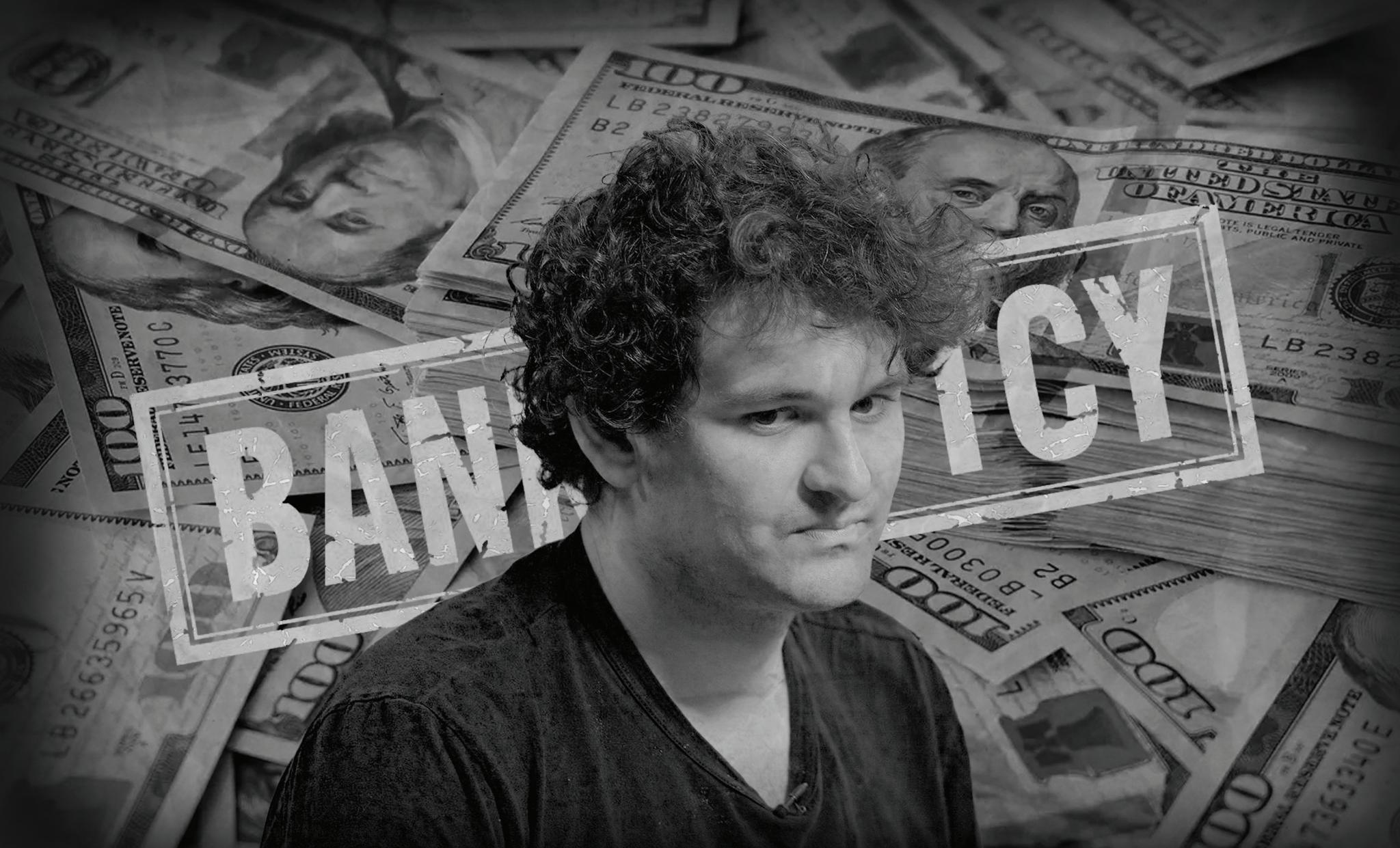
On December 13, 2022, the Federal Trade Commission fled a complaint against FTX, seeking a permanent injunction and monetary
damages. The complaint says that the company didn’t give enough information about the risks and costs of its products and services, which could have misled investors. The Federal Trade Commission is also accusing FTX of not being registered with the agency.
This news has caused a great deal of uncertainty in the cryptocurrency industry, as investors are now questioning the potential impact of FTX and the Federal Trade Commission’s action on the future of the industry.
Oliver Jones ‘24, the leader of
global reach of the technology make it challenging to enforce these regulations.
Although the collapse of FTX has caused large amounts of chaos and affected many different parts of the cryptocurrency market, Jones is not convinced that this will necessarily turn people away from cryptocurrency, “This is a major low in the cryptocurrency world right now, but that might also convince some people to actually get in since you want to buy low and sell high,” Jones said.
Students quantify response bias in latest
AP Stats project
CaRlos HeRedia Marketing Director
Stocks and Finance club, says that this type of fraud is not an unexpected outcome in the cryptocurrency space. “Since there are no regulations and it’s so decentralized, I personally feel that makes it much more chaotic. It makes it more risky,” he said.
Cryptocurrency is largely considered to be an unregulated asset class due to the decentralized nature of the technology. Some countries have attempted to impose regulations on cryptocurrency, but the lack of a central authority and the
Investing in cryptocurrency is generally considered to be more risky than investing in traditional assets such as stocks or bonds. Cryptocurrency prices are known to be highly volatile, meaning that they can fuctuate dramatically in a short period of time. This can result in large losses for investors.
Ultimately, the most effective strategies for avoiding similar events and fraud in the cryptocurrency space is just making informed decisions. Before investing in anything, it’s important to take the time to research the opportunity thoroughly. Look for information from trusted sources such as government agencies, fnancial institutions, and established fnancial publications. “When you research a company, there’s quantitative data – income, revenue, you need to see they’re growing year after year. I look at these and see how their management is like, I see how they do in a recession,” Jones said.
Additionally, not investing in cryptocurrency coin or with a single company decreases the risk of potentially losing large amounts of money to fraud. “One investment strategy that I believe in is dollar cost averaging, which is instead of pooling all of your money and investing it right away, you spread it out and invest a certain amount every month. So, over time, no matter what happens with the fuctuations, you’ll be less affected by it in the long run,” Jones said.
If you’ve been on campus these past few weeks, chances are you’ve been asked to take a survey. Students taking AP Statistics have been collecting data for their most recent project, measuring different forms of response bias.
Research projects have sought to answer questions about the potential for response bias, such as whether the wording of a question, the provision of additional information, the characteristics of the interviewer, the anonymity of the respondent, manipulation/order of answer choices, or revealing other people’s answers to a questions could response bias.
The project began with the students designing their own survey. They asked questions such as “How often do you lie?” or “How do you use technology in class?”, with alterations in the survey to try and measure certain forms of response bias.
Senior Nico Riley looked to measure response bias with the question, “Are you fashionable?”
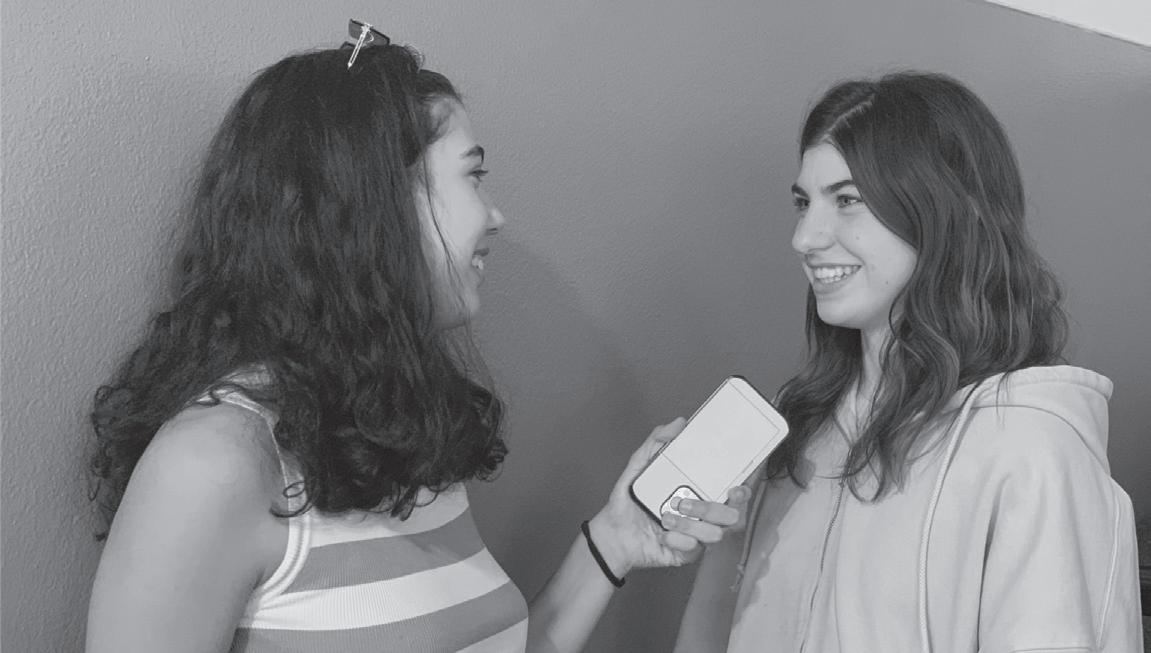
“I looked to see if a fashionable interview versus a more casually dressed interviewer would change the response” he said, “I asked 40 people in all, including the other interviewer, asking the frst people we saw.”
“The results were pretty split. People seemed to have already known whether they were fashionable or not, they didn’t have their own perceptions. So the characteristics of the interviewer didn’t really affect them.
Senior Jocelyn Acevedo looked to see whether anonymous or in-person interviews would make a difference in responses to the question “How often do you lie?” with fve options: 0-5, 5-10, 10-15, 1520, and 20+ times a week.
“I would either walk up to people and ask them directly or hand them a piece of paper to answer anonymously. In total I asked 40 people in each group. People put that they lied more when it was anonymous than when it wasn’t anonymous.”
The distribution of answers also changed in her survey, with more willingness to admit to higher ranges of lying than when asked in-person.
“People lied way more than I thought they would,”
Speaker of the House deadlock : Sign of what’s to come in Congress

RICKY REDOR/FLICKR
Rooke WiseR Advancement Manager
SAM BANKMAN-FRIED THE former CEO of FTX, has been largely blamed for the collapse of the FTX.
COLLECTING DATA, CAROL QUEIROZ ‘23 interviews Hanna Frasca ‘23 in the Dining Hall. Her research question is: “Is comp sci the most popular college major?”
CAROL QUEIROZ/TOWER
KEITHREIFSNYDER/FLICKR
THE CAPITOL BUILDING, WHEREIN the partisan Speaker of the House debacle ensued. Notably, alumnus Zachary Fisch ‘10, a former Tower Editor-in-Chief, worked on the Hill as former District 17 congressman, Mondaire Jone’s, Chief of Sta until June 2022.
“
Since there are no regulations and it’s so decentralized, I personally feel that makes it much more chaotic. It makes it more risky.”
TOWER/FEB.3, 2023 NEWS 3
- Oliver Jones ‘24
OpiniOn
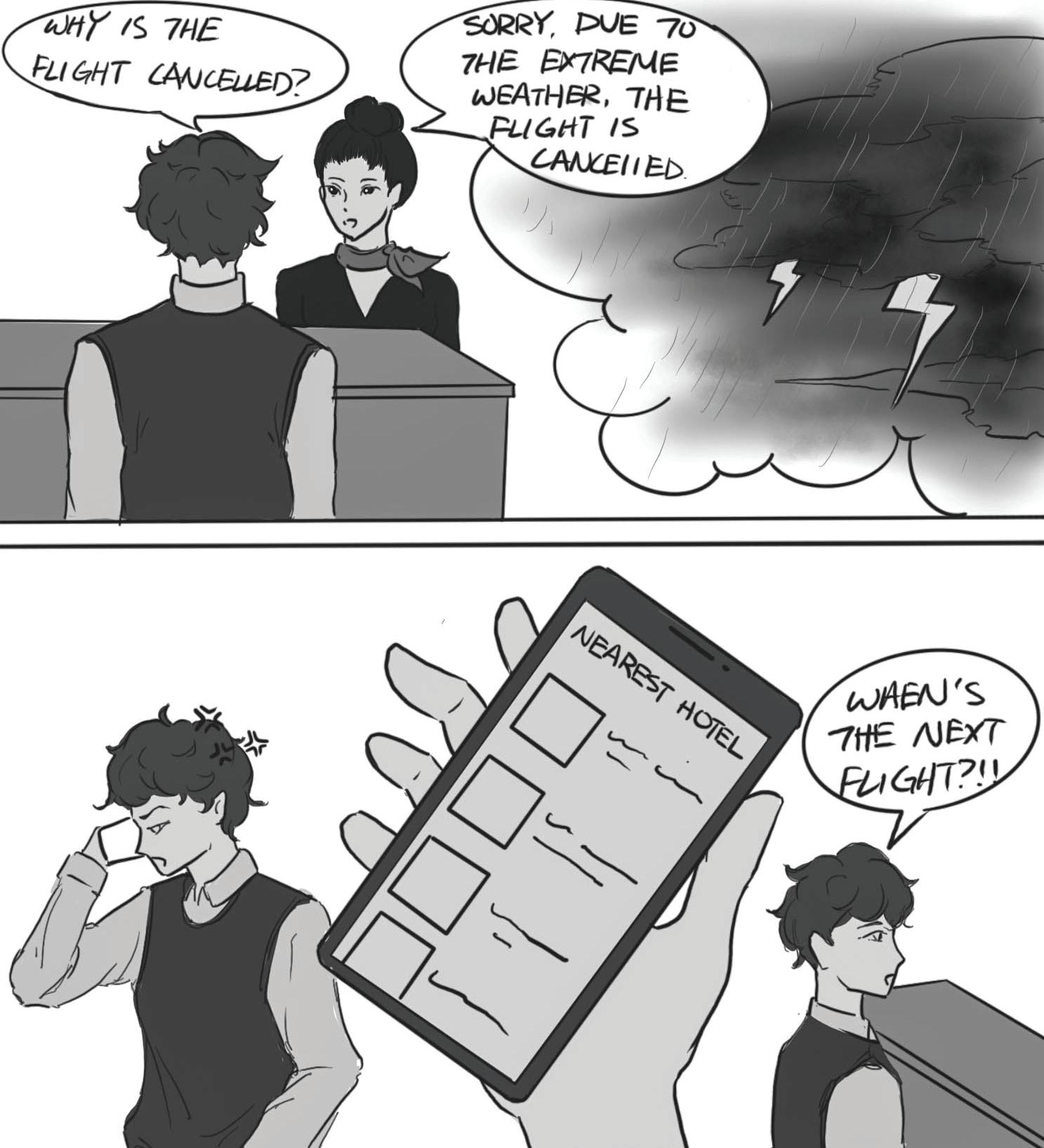
EDITORIAL
From past to present: the continued fear of the new
is in every piece of writing, a fridge for keeping our groceries, instant mac and cheese, and the list goes on and on. Now, even our education’s future is uncertain as artifcial intelligence programs such as ChatGPT threaten to render us even more incompetent. What would Plato think about our world today? And what should we think?
The way students are educated is ever-changing. In 50 years, Masters may have fully surrendered to the power of new technologies. The campus might be on fully renewable energy, the mailroom might be fully autonomous, Tower might exist only on the internet, the parking lot might become a charging station, and paper handouts might become a rare sight in the classroom (if they are not already). However, most importantly, the defnition of academic
A
integrity might be drastically different from ours now. The ethics and morality of AI consumption are vague. There is no clear line in the sand that lets us know when the use of AI in education is considered plagiarism or cheating. If the tech keeps developing, it could take away jobs. If the materials AI generates become the same or even better than those written by human beings, then what is the point of having writers, journalists, teachers…? We need to keep in mind the morality and potential negative consequences of technological advancements which may seem convenient at the moment. As we move forward, things will get more and more tempting, and, just as it is important to consume media sensibly, it is up to us to consume technology responsibly.
cheap airlines really “cheap”? Or are they a scam?
its to their account instead of a full refund.
irplanes should be a means of transportation that gets passengers from one place to another in a timely, efficient and safe manner, without adding to their worries. During the holiday season, most airports are crowded with overly dense flights, disrupting the entire itinerary for both the flight attendants and passengers. Such chaos is especially devastating for cheap airlines: Spirit canceled 25% of flights and delayed 48% of flights; JetBlue canceled 11% of flights and delayed 59% of flights; Southwest had the most severe system breakdown, canceling 42% of flights and delaying 48% of flights.In addition, most cheap airlines have low-rated customer service and very few professional staff in the airport who are able to direct its passengers to the right place. Miscommunications such as giving out false information about fight departure time, directing the passengers to the wrong gate, or not checking updated fight information can cause serious problems to its passengers.
price scheme, cheap Airlines would have to think of a solution for their backward system, unorganized flight schedules, and to avoid crises like the Southwest meltdown.
2022-2023
editors-iN-chieF
Maia BarantsevitCh ellie yanG
MarketiNg director Carolos heredia
News Lead editor Gisele Cestaro
News editors oliver KreeGer alexa MurPhy
opiNioN Lead editor Maya PhilliPs
opiNioN editor Matthias Jaylen
Features Lead editors Mariana Gu luCas seGuinot
Features editors tara PhilliPs lily zuCKerMan
sports Lead editor noah Kassell-yunG
sports editor adaM Bello
sociaL Media MaNagers lydia ettinGer sandra liu
weB editor xavier rolston
staFF writer viKtoriia soKolenKo
photo editor Josh MarKowitz
On October 19, 2022, Spirit Airlines shareholders approved a takeover by JetBlue Airways, ending the six-month battle for the fifth-largest carrier. JetBlue’s CEO Robin Hayes said in a report that “Spirit and JetBlue will continue to advance our shared goal of disrupting the industry to bring down fares from the Big Four airlines.” However, the truth is that although cheap airlines reduce the financial burden on passengers, they in reality are draining their passenger’s patience, wasting their time, and adding a lot of extra costs to them, all at their own expense. For those who are traveling to another country, canceling a flight means they have to spend money on hotel and dining, especially when the next available flight is days after. Some companies, like Spirit Airlines, only compensate their passengers through giving out cred -
Of course, the poorly constructed system that operates an airline will lead to severe consequences. During this past holiday season, Southwest Airlines experienced huge monetary loss and collateral damage as it did not have standby crew ready to take off. Its “point-to-point” model that serves smaller markets and sends passengers directly from one spot to another led to the greatest meltdown in the history of all airline companies.
Pilots and flight attendants were scattered across the world due to delays, flight cancellations, and weather conditions, and the airline had to cancel over 2,500 flights. Some passengers couldn’t rebook flights on the same day and spent hundreds of dollars with car rentals and hotels –– the airline should be responsible for the additional cost. Not to mention how certain airlines like Spirit Airlines do not refund their passengers but use a “credit” policy, a form of refund through vouchers that are exclusive to the airline.
Thus, it is important to keep in mind that “there is no such thing as a free lunch.”
The low ticket price comes with higher risks of cancellation and delay, turning a supposedly pleasant and enjoyable trip into a chaotic and horrible experience. As more people become aware of the low-
The Parallels between U.S.
and Brazil’s insurrections
Lead copy editor aurora rose horn copy editor aviv eMery accouNtaBiLity aNd Media advaNceMeNt MaNager rooKe wiser
executive producer, tower Broadcast News Carol Queiroz hanna sChiCiano
staFF photographers aNd iLLustrators Chana KiM lisa yao euniCe wanG Jenny xu anGel henriQuez sydney starKey eleanor sChalKwyK
The political unrest in Brazil is reminiscent of the events following the 2020 presidential elections in the US. The candidates, Bolsonaro and Luis Inácio Lula da Silva, represent two different political extremes.
The left-leaning candidate Lula was victorious. Bolsonaro is seen by many as a figure that politically resembles Donald Trump. According to the BBC, he has
fter violent rioters stormed the U.S. Capitol on Jan. 6, 2021, American and global democracy are in a perilous position. The stakes were incredibly high for Brazil’s presidential election in October 2022. This was a pivotal election globally due to the fragile state of democracy and the wide range of pressing issues Brazil currently faces. The struggle between autocracy and democracy is playing out in Brazil. Brazil’s insurrection and former president, Jair Bolsonaro’s flight to the US, further dramatize the crumbling state of democracy in the US. The US was always a paragon for democracy. However, its moral standing has been tarnished. It is a disappointment that challenges to democracy in the US are going global, inspiring violence and democratic backsliding.been nicknamed “The Trump of the Tropics.” Trump and Bolsonaro have both built their brands on strong conservative values, while vowing to counteract crime and corruption. They pledge to bring back the more prosperous past to their country’s future. Bolsanaro lost despite his countless efforts to steal the election.

According to the New York Times Bolsonaro is a strong advocate of military dictatorship. He has frequently incited bigoted hatred and discriminated against
Black and indigenous people in addition to women and members of the LGBTQ+ community. His opponent President Luiz Inácio Lula da Silva is a former leftist president who served as President of Brazil
However, in 2016 Lula was convicted for ataking bribes, accepting favors and money laundering. His house was raided and he was questioned. Within the year, he faced six corruption cases. In
right-wing Bolsonaro supporters stormed the Congress building, the Presidential Palace, and the Supreme court (all three branches of government). Similar to the US, the rioters refused to accept the outcome of the election. This was a situation that many Brazilians feared. Security services responded with tear gas and struggled to regain control of the capital. The government computer system was attacked and artworks were vandalized.
These events are a direct ripple effect of America’s own insurrection. If one watches the images from both events side by side they have a haunting resemblance. However, Brazil’s insurrection is not just a parallel to what happened in the US. It is made worse by the fact that rioters were not just angry that Bolsonaro lost. They are outraged that Lula won, because they believe he belongs in prison. It is a shared belief among many right-wing extremists that Lula is a communist who plans to start a communist dictatorship.
FacuLty advisers ellen Cowhey Matt ives
online MeDia For more information, follow Tower on the following platforms: Website: Tower.MastersNY. org
Facebook: MastersTower Twitter: @MastersTower Instagram: @MastersTower
Distribution Process Tower is hand-delivered on the day of publication to the Upper School. 650 copies are printed. A copy is sent to each of our advertisers.
from 2003- 2011. He champions social welfare programs. During his past presidency, he introduced new programs that brought millions of Brazilian citizens out of poverty.
Lula’s humble background and leftist views appealed to many lower and middle-class citizens, garnering him political support.
2017, Lula was convicted and was sentenced to 10 years in prison, but he was vindicated, proven innocent, and has since regained power. However, the political divide in Brazil continues to worsen.
On Jan. 9, 2023, just days after the anniversary of the January 6 insurrection, thousands of
The Brazilian police failed to do their job. Although many were aware of the possible attack no preventive measures were taken. Fearing prosecution, Bolsonaro fled to Florida, where he has allegedly found a safe haven with former President Trump.
scholastic Press affiliations, letters anD eDitorial Policy Tower is the winner of the Pacemaker Award for Overall Excellence, an award-winning member of the National Scholastic Press Association (NSPA), Columbia Scholastic Press Association (CSPA), Journalism Education Association (JEA) and Quill and Scroll. We encourage Letters to the Editor, which can be submitted to the following email address: TowerEditors@MastersNY.org. Published approximately five times a year, Tower the student newspaper of The Masters School, is a public forum, with its Editorial Board making all decisions concerning content. Commentaries and opinion columns are the expressed opinion of the author and not of Tower and its Editorial Board or its advisers. Furthermore, the opinions conveyed are not those of The Masters School, faculty, or staff. Unsigned editorials express views of the majority of the Editorial Board.
4 OP-ED TOWER/FEB. 3, 2023
advertisiNg & distriButioN MNg Justine PasCutti TOWER
In Plato’s work Phaedrus, he details a disdain towards writing. He believed that if writing were to be popularized, the people would “cease to exercise memory because they rely on that which is written, calling things to remembrance no longer from within themselves, but by means of external marks.” Now, thousands of years later, this message is still relevant. However, this time, the subject in question is not writing, but technology. In the rapidly advancing modern world, technology has made things easy for us. However, when should further advancement become concerning? Just as Plato was concerned about writing’s negative effects on human memory, technology is taking over our lives and doing our chores for us. There are robots for vacuuming our house, auto-correct
A
Are
MAYA PHILLIPS ARGUES THAT the Jan. 6 insurrection at the US Capitol set a precedent for future challenges of democracy. She compares Brazilian Candidate Bolsonaro to Donald Trump with their conservatism and predjudice.
coNtriButiNg writers ella BlaCK Philine hellrieGel
JENNY XU/TOWER
EUNICE WANG/TOWER
“It is the same with written words. They seem to talk to you as though they were intelligent, but if you ask them anything about what they say from a desire to be instructed they go on telling just the same thing forever.” -- Plato, 370 BCE.
MARIANNA GU
Lead Features Editor
MAYA
PHILLIPS Lead Opinion Editor
Sustainably Sweet: How one chocolate shop can make an impact
Down the hill from Masters, at 11 Cedar Street in Dobbs Ferry, Joy Thaler, runs a new and sustainable chocolate store, called The Pod. The Pod, a social impact business, first opened a year ago, on Feb. 7, 2022.

At The Pod, Thaler is known for selling a variety of hot chocolates, with sweet, bitter, and even
spicy hot chocolate. Thaler also makes her own chocolate chip cookies, brownies, and chocolate bars. The Pod also showcases chocolate from cacao farmers who sustainably grow and make their chocolate at origin.
Before founding The Pod, Thaler was employed at Thomson Reuters, a Canadian media company, working in quantitative analytics. She was building a product that measured the weight of words called the sentiment engine. Through building that product,
she was able to work and make connections with many people in different industries, including people in the coffee and chocolate industries. Thaler highlighted a conversation she had years ago, saying, “I made a comment that I was happy for the cocoa farmers because the pricing was at the highest point. And somebody said to me, let me explain to you about pricing of the cocoa industry.
After that conversation, I spent three years researching the industry and stumbled upon children
that were getting beaten with chains, when they were promised bicycles. That is how I began this journey.”
In addition to egregious child labor abuse, many sectors of the chocolate industry engage in economic injustices. Thaler believes in supporting cacao farmers’ businesses and rights by buying their products, both beans and chocolate, directly from farmers. Typically, in the chocolate industry, cacao farmers grow their beans and sell them to large corporations for low and unsustainable prices. Instead, Thaler focuses on buying chocolate straight from the farmers, and she only buys chocolate and beans from farmers she’s made personal connections with, saying, “People are like, ‘Oh, you’re a curator of chocolate,’ and I try not to get upset about it because I’m not a curator of anything. I have relationships with people whose values I align with and together, we bring their products in.” Thaler has made connections with cacao farmers from all around the world, from places like Tanzania, Trinidad and Tobago, Brazil and more. Thaler said that the cacao farmers didn’t want to just
grow and sell the beans to large companies for low prices. They wanted to harvest the beans and make the chocolate themselves.
By buying chocolate directly from the farmers, the middle man is eliminated, and The Pod is able to support small cacao farmers who can harvest and make the chocolate at its origin.
Thaler noted how a lot of the chocolate industry can be unsustainable and have a negative impact on the environment. She said, “There’s a group of people that are oftentimes funded by large companies and their role is high yield. Why? Because, high yield oftentimes aligns with high profit. And my understanding is that oftentimes they use hybrid seeds and, those tend to diminish the value of the soil faster, which means that it deteriorates, and that it leads to more landslides, which leads to water pollution.”
Thaler and The Pod’s practices differ from larger companies’ unsustainable practices by only buying sustainably grown chocolate. Thaler’s suppliers never use any chemicals to grow their chocolate.
She said, “The people that we purchase from are very transparent about their fermentation processes, and how they don’t use chemicals. It’s just not where they come from. It’s just not how they’ve been raised and taught. So you can count on these smallholder farmers upholding that.”
By buying only sustainably grown chocolate, Thaler and The
Pod also promote growing methods that are healthy and sustainable for our environment.

One unique feature of The Pod is its art gallery. The Pod’s art gallery showcases work from local artists, where they’re able to share and sell their art. Different types of visual art are displayed at The Pod’s gallery like drawings, paintings, and photographs. Whenever a work of art is sold at the Pod, 70% of the profit goes back to the artist and 20% of it goes to mental health and wellness organizations and the other 10% goes back to The Pod.
So far, The Pod has donated to the John Kelly foundation, (JCK) a local organization, based in Dobbs Ferry, that works to improve mental health and wellness in today’s youth.

Thaler hopes that the art gallery will inspire people to use their creative expression to process, heal, connect, and empower one another. Thaler has been able to successfully host events at The Pod in the past like a Music Meditation and Mindfulness with a professor from the local Mercy College and a roundtable discussion event talking about the decolonization of chocolate, but more community events are in The Pod’s future goals. Thaler said. “We’re a community space, I like to look at us as a community space first, before a chocolate manufacturer.” Thaler really encourages the local Dobbs Ferry and River town communities to visit The Pod and bring their ideas for future community events.

TOWER/FEB. 3, 2023 FEATURES 5 ANGEL
SITE WALKTHROUGHS Our Services Daily Building Maintenance Janitorial Services Between Case & Operating Room Cleaning Electrostatic Spraying & ATP Testing Terminal Cleaning Steam Sterilization Post-Construction Clean-up Window & Glass Cleaning Floor Care, Carpet Care & Restoration 24/7 Emergency Response 914-915-9062 aluiso@servocind com Why Us? 55 Years in the Industry Same Ownership 24 Hour Service Daily Building Maintenance
HENRIQUEZ / TOWER
Matthias Jaylen
Opinion Editor
JOY THALER, OWNER OF The Pod, prepares cookies for sale. She buys her cocao beans directly from their farmed source. Brownies and othe delicious choclate bars are also offered as products.
I have relationships with people whose values I align with and together, we bring their products in.”
“ - Joy Thaler
ADAM BELLO Sports Editor
The college admissions process is one of the most stressful parts of a student’s high school career for many reasons but standardized testing is arguably the biggest. A student’s test score on the SAT and ACT are one of the biggest deciding factors in a student’s admission to a college or univer-
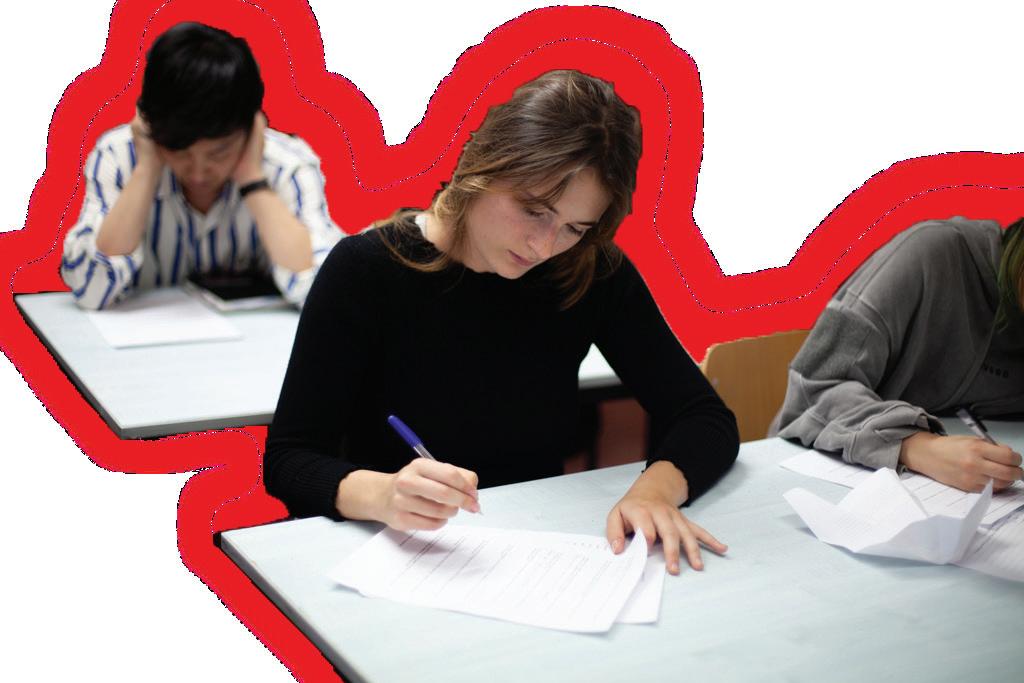
The
sity. Students all across America spend countless hours studying to get the best possible score on these tests. These tests are open to all high school students from both public and private schools, however, private school students seem to get consistently higher scores than their public school peers.
The national average ACT score for a public high school student in 2022 was 19.8 out of 36 points, compared to the average score for a private high school student being 26. The average SAT score for public high school stu-
dents, a test out of 1600, was 1060 while the average private school score was a 1250. While the difference in these scores might not seem drastic, there are major reasons for the imbalance between the test scores in these two types of schools.
The average salary of a private school student’s family household is from $150,000- 350,000 depending on the state you are in, which is 200%500% more than the median household income in the US, about $70,000. Because the typical private school student in the US has a higher family income they have access to preparation programs that public school students often do not.
It is common for both private and public schools to have a company or service they have partnered with to help their students prepare for their respec-

Western
tive tests. Public school college counselor at The Bronx Center of Science & Math (BCSM), and Masters parent, Ana Hernandez, explained the prep provided at her school saying, “Historically (pre-pandemic), we would offer our students test prep. We would use different companies and would provide test prep for the October and November SATs, and would also provide it for the April and May SAT for juniors. For seniors, we would only provide prep for the October and November tests.”
While not all public schools are the same, many have similar policies and programs, offering one or two differ ent programs for their students’ test prep. If they are not compatible with that program or their tutor, they have to fnd another on their own, or simply continue with a program they don’t fnd helpful. While in a private school environment students often fnd their own private tutors and programs to help them, this is a luxury many public school students, especially in low-in come communities, don’t always have.
Hernandez explained, “Our school is 78% frst-generation students
and low income. It is not very often that we see students go through the test prep process on their own… There are only about one or two students who do that per year, and they typically come back to us during crunch time.” Hernandez explained that test prep is only offered in the fall of students’ eleventh-grade year at BCSM, when private school students tend to start studying earlier.
Thomas O’Grady, a tenth grader at Masters, has had a typical independent school SAT expe
8th grade. “I started studying for the SAT specifcally in the summer going into my 9th grade. The Masters Community, people around me, and the environment I’m in have really pushed me to study and be the best academic I can in general and with the SAT,” he said.
O’Grady said that his school atmosphere had an impact on rigorous studying, and his mother has also pushed him to continue studying for the test. He said he will continue to work on his SAT prep even more going forward.
lens on beauty:

how European beauty standards are still in play today
AVIV EMERY Copy Editor
Every morning, the students at Masters begrudgingly wake up to their alarm clock, roll out of bed, and get ready for school. One key step of this routine for many is putting on makeup. Primer, blush, concealer, eyelash curler, mascara, repeat. Although the steps may vary, many students put at least some product on their faces every day.
Makeup has been evolving since about 5,000 years ago in ancient Egypt, when both men and women used makeup to enhance their appearance. For the smell and softness of the skin, incense oils were used, and women applied white on their faces to protect themselves from the sun. The Egyptians were also the frst to use black paint as eyeliner, and to create a natural blush crushed fowers were used.
The beauty industry that sells makeup and other products has long perpetuated the idea that being white is the ideal beauty standard. Thanks to a history of European colonization over the past fve centuries, Eurocentric beauty standards became global. Pale skin, light-colored eyes, small noses, straight, fowing blonde hair, and high cheekbones were defned as the pinnacle of good looks. Though this notion has faded some in the past decade, it still remains
dominant. Senior Angelica Lopez Tucker said, “I’m half Bwwlack and half Puerto Rican, so I’m a woman of color, however, I have lighter skin, a lighter complexion, so I feel like I have benefted from a bit of privilege in that sense, especially if it comes from certain beauty standards.”
Ileya DuBoulay, a 2019 Masters alum, was a childhood model who recently got back into the modeling industry. Of East African descent, they have found that photographers don’t know what to make of their naturally very curly hair. “I don’t know if it’s because I have short hair, or because Black models with short hair is a thing but, sometimes they’re very quick to tell me to put on a wig or give me a wig. I don’t usually have a problem with it, but when I’m seeing everyone else get full attention on them and their natural hair and then for industries to not have that level of diversity with one hair type it can defnitely feel bad.”
White beauty standards were perhaps most obvious during Elizabethan times when Queen Elizabeth I started to apply a thick layer of white foundation onto her face. Pale skin came to be associated with nobility and wealth, as poor women were forced to spend all day in the sun.
Other civilizations have since used makeup to emulate European features. In Mongolia, women of royal status painted red spots on their cheeks, and in Japan, geishas painted their faces white.
Today, although they don’t normally paint their faces white, people of color are often forced to wear shades of makeup that don’t match their skin tone. Companies have purposefully left out darker foundation shades, continuing to cater to white and lighter-skinned people. It can be diffcult to fnd black and brown shades.
In 2018 the cosmetic company Tarte sparked controversy with their “Shape Tape” foundation that included only two brown and two black shades. Other companies have had similar problems. It Cosmetics, YSL, and BeautyBlender have all underrepresented people of color in their product lines. Shola Badewa, a You on social and diffculty fnd dation shade that matches her skin tone.
“It holds me back when I’m trying to fnd affordable ways to play around with makeup, get my own founda tion color and there’s no shade in my color at all. I’d have to
mix two or three different foundation colors in order to fnd the right shade, and even still, the formula doesn’t work the same,” she said.
Thankfully, cosmetic companies are beginning to change their practices. Fenty Beauty and Urban Decay have released foundation lines with ffty shades, with Fenty Beauty’s
line is conscious not only of being inclusive towards people of color but to people with unusually light skin, including a light shade that was designed for people with albinism. But Badewa still questions the motivations of beauty companies. “I would love to see more companies and brands not just take Black people or people of color as some kind of spokesperson to advertise. Like actually genuinely care about the audiences that they’re advertising to and accepting them in their advertising,” she said. With New York Fashion Week starting February 10, it’s important that the beauty industry continues to work to remove the western lens on beauty, and, make sure that these beauty standards don’t come back or change. DuBoulay is optimistic that things will continue to improve. “I would say that the changes in the industry were one of the biggest reasons I felt the confdence to get back into it, I’m seeing a lot more out queer models, I’m seeing a lot more people from all types of backgrounds that I’m modeling with,” they said.
Lopez Tucker also sees progress, but is looking for even more.”I feel that now we’re deviating from that Eurocentric modeling chetype. But I think there’s still a ton more work in order for all people to feel included, and for kids to grow up and see themselves represented to think that they’re beautiful and that they’re important,” she said.
Middle School teacher shares love for comic books and experience with personal identity
VIKTORII A SOKOLENKO
Staff Writer
While teaching IEC in the Middle School, Rae Johnson has continued to pursue their life-long passion: art. In January, they showcased their work in an FC exhibition. Their art stood out in its creativity with a style similar to comic books and illustrations.
“There are different tools that you can use in comic books, because you don’t have to say everything out loud,” Johnson said. “You can show some things with imagery, you can show things with dialogue. And you can show just through the character’s design…certain aspects of their identity, just by the way that they look and they are designed.”
Johnson draws inspiration for their work from tabletop RPGs, fantasy stories, and Japanese manga. Growing up watching Pokemon and Sailor Moon, they became drawn to the unconventional style and themes covered in Japanese comic books and shows.
“Just seeing a show that was just about young girls dealing with young girls’ problems, that didn’t exist in western cartoons,” Johnson said. “That appealed to me right off the bat way more than a superhero cartoon that you would see on TV at the time would have. Also, the way that manga is drawn
just adds more, I think, ambiguity to characters. All characters [may seem] the same until you put them in a costume or a different scenario.”
Many of the portrayed characters represent Johnson’s experiences, particularly with gender identity.
“What I try to express through my artwork is maybe sort of a more holistic or a more inclusive perspective, especially on personal gender identity and sexual identity,” Johnson said. “So for a lot of the characters that I create, they are sort of different aspects of masculinity or femininity, or something altogether different than that. And when they talk to each other, it helps me to work out some of the conficts that I see in the world and in my own life.”
A 2011 Masters alum, Johnson returned to the school as a teacher in 2020. They said that their experience in art has helped them in teaching IEC to middle schoolers.
“There is a lot of creativity that goes into the projects we do [in IEC classes],” they said. “For the Middle School IEC program, the priority is on using basics, like 3D modeling and coding, creatively and making things that are maybe not super complicated, but that are fun and functional, and that are expressive in some way. So I think that being creative is essential not only for me as a teacher, but for the students to put into the work.”
Besides teaching IEC, Johnson also leads the Middle School Gender and Sexuality Alliance. They work to educate their colleagues and students on the history of and current issues affecting the LGBTQ+ community.
“[GSA is] also helping [middle school students] express themselves, helping them to fnd the information and the language they need to help educate themselves and their peers,” Johnson said. “As a teacher, I think a lot of my activism has to happen in the classroom, because I know that the students that I’m teaching are going to be the ones making the changes that they want to see later in life.”
While studying at Masters, Johnson pursued their passion through various art classes. They credited Bruce Robbins and Cheryl Hajjar, art teachers
in Middle and Upper School respectively, as a huge source of inspiration and support for them.
“This school has always allowed me to put as much time and effort as I wanted to, into the skills that I wanted to learn,” Johnson said. “By being able to learn new art techniques, I was able to express myself more clearly and get more involved in the art world, beyond just my small perspective as a cartoonist.”
Cheryl Hajjar said she followed
Johnson’s art throughout the years and has long wanted to exhibit their work.
”[Johnson] has a natural way of spinning a story using both words and images,” Hajjar said. “I thought that it would be very meaningful to exhibit their work so that their middle school students and former middle school, now upper school students could witness how prolifc and impassioned they are about art.”
As a student, Johnson made
many friends through the fandom and the stories they enjoyed. By sharing their art with other artists online or in art camps, they built connections with others and developed as an artist themselves.
“I’ve never published anything outside of a school,” Johnson said. “For me, it really has always been about the community aspect, and not so much about making the work, but just about talking to people and telling stories together.”

6 FEATURES TOWER/FEB. 3, 2023
CREATIVE COMMONS/ABSTRACT MACHINE
ILEYA DUBOULAY
ILEYA DUBOULAY ‘19 has been modeling for the past few years, after taking a break since young childhhood.
ILLUSTRATIONS BY RAE JOHNSON exhibited in the FC during December and early January 2023.
Is problem based learning benifical?
Con: A problematic based learning Pro: An academic necessity
Picture this: I’m sitting in my ninth grade Geometry class, head in my hand, looking at the worksheet in confusion. I look around to observe others struggling as well, but I also see students who have already finished the sheet with ease. This was the first time I came to understand what problem-based learning (PBL) was, and the toll it would take on my grades along with my mental capacity. Students who are new to this method could potentially experience feelings of doubt or a drop in their academic performance due to a rigor that is not inclusive to all learning types. Not all classes at Masters operate using this method, as PBL targets math and science courses.
For those who may not be familiar izh the term, PBL is a learning style in which students apply their past knowledge to new material, without having been taught first. This differs from traditional learning because students don’t have to memorize the material before applying it conceptually. My experience regarding PBL has generally been negative, due in part to learning differences, and also being forced to teach myself the material outside of class. While I understand that PBL may be an effective method for some, it does not work for everyone, and I believe that students should be able to take a course without having to teach themselves. Ninth grade geometry was my first experience with PBL, and I was almost forced to drop the class. The class plan was a structure I wasn’t used to, which involved completing worksheets and writing the homework on the board, but this was all without teaching the necessary math prior. I went for extra help and had a tutor outside of school, but ultimately it was difficult to catch up on a subject that was constantly moving forward. I felt I was stuck in an honors class that I wasn’t even signed up for. Math is already one of my tougher subjects, which meant that the PBL style of teaching, combined with my learning differences, felt like a battle I wasn’t going to win.
Aimee Ayala, a senior, has been at Masters since seventh grade and has taken two PBL courses, one of them being regular geometry. The second course she took was Precalculus during the second half of her junior year at the High Mountain Institute (HMI). Ayala feels that PBL is not a one size fits all curriculum, and comes with a large downside. “I don’t think it’s an effective way to teach or learn concepts. With Geometry for example, it was all so abstract. There wasn’t really much of a foundation you got when taught using PBL,” she said.
Ayala maintains that it’s an isolating way of learning, because when it’s the same students in class who figure out every worksheet, while you don’t get it, you feel like you’re falling behind. “PBL makes you feel alone, partly just because the idea of getting concepts explained to you by your classmates feels condescending. And if you have a hard time with math, or a learning difference, it’s going to be a difficult setting to get used to,” she said.
There are benefts to PBL such
as more collaboration with peers and learning how to navigate teamwork. Stella Carey, upper school math teacher, is a supporter of PBL because of the critical thinking students learn to develop, but also recognizes that it’s a diffcult technique to learn for teachers. “In PBL, the role of the teacher is much more as a guide and support, which is challenging to fgure out how to give guidance without giving the whole problem away,” Carey said. However, I feel those benefts are minimal because there are aspects of a traditional class such as group projects that will help to strengthen those skills all while teaching the material beforehand. Scaffolding is a useful technique in which students are presented with some background knowledge before applying concepts. As Carey said, “Scaffolding is when you are
provided steps by your teacher to better assess the problem,” . I believe students shouldn’t have to hold themselves back from more advanced courses because of PBL.
Honors Algebra two/trigonometry for example, is another PBL course at Masters. What makes an honors course shouldn’t be the use of PBL, but rather learning the material faster and more assessments, which is standard in most other classes. However, what I do appreciate about this part of the curriculum is that there is a choice to take it. This is different from Geometry, a course all students must take, where students are thrown into the deep end, often in their frst year of high school, and are forced to either sink or swim. “I think the PBL method should be abolished across all geometry classes. Don’t make every ninth grader do it,” Ayala said.
JOSH MARKOWITZ Photo and Illustration Editor
Everyone had that one class. You know the class I’m talking about. The class when the teacher goes on and on AND ON about both relevant and irrelevant topics. Walking into class, you don’t know if they will talk about their last vacation or a lesson plan you were supposed to finish three classes ago. Allow me to present the solution: Problem-based learning.
Problem-based learning is a cornerstone of society’s educational learning process. The Cornell Center for Teaching Innovation explains that “Problem-based

learning (PBL) is a student-centered approach in which students learn about a subject by working in groups to solve an open-ended problem. This problem is what drives motivation and learning. ” This is very different from traditional classrooms where teachers stand at the front of the room and lecture to students. Unlike boring, old-fashioned lecture classes, PBL asks students to wrestle with problems, learning as they struggle to figure things out - which is exactly how the real world works. PBL works and has been proven to provide the necessary skills that are necessary for an ever-changing workplace, such as critical thinking skills, problem-solving abilities, and communication skills. It can also offer opportunities for working in groups
How much is reality and how much is a show?

ceived notions based on clothes.
A ROSE HORN Lead Copy Editor
Reality shows are extremely popular:
52% of American adults watch at least one hour of reality TV in an average week. When it comes to reality TV, my opinion of it has shifted a lot from what it used to be: I used to think it felt too good to be true. Take for example Love Island, in which hot singles live together in a tropical island villa and go on dates with each other. While watching Love Island for the frst time, it felt really staged to me. But when I watched the show some more, I saw that it wasn’t all fake. The emotions-- from love connections shared between contestants to tears shed during the meeting the parents scenes-appeared genuine to me. There are couples like Molly-Mae Hague and Tommy Fury, who stayed together for 3 years after their season ended.
Another show to take into account is Dating Naked, which is exactly what it sounds like: the men and women on the show go on dates while completely nude in order to avoid precon-
The frst episode of this show centers around Joe and the unfortunately nicknamed Wee Wee (no, I am not making this up). Joe and Wee Wee ended up together by the end of the episode, and even after their episode they stayed together: in an article for Women’s Health Magazine, Wee Wee said, “Since the show, our relationship has continued to blossom and grow. We don’t go a single day without talking and often talk at least three times a day. Joe and I have a big age gap (I’m 36 and he’s 24), but I think that’s what makes it so interesting. He brings out the girly, fun side of me, and I give him a sense of comfort and maturity. It’s a great balance, and we defnitely have a unique and special relationship.”
A counter-example, though it’s a favorite show of mine, is Netfix’s The Circle, which is essentially a popularity contest. The goal is to become the most popular player, and all the interactions are had without anyone seeing another player in the fesh. Most of the connections made are strategic, and some people even play as “catfsh”, or people who are not themselves. All in all, you have to lie in order to come out on top;
it’s part of the foundation of the game.
Greg Lesser, a history teacher who taught the WinterMission class on reality TV, said of reality shows, “I always wonder how much of a role producers play in setting things up.” Lesser does not watch dating shows-- the reality shows he prefers to watch are competition shows such as Survivor, The Challenge and Top Chef-- yet he is still wary of some elements of reality TV being staged. Lesser even cited a specifc example: in Love Is Blind, a dating show on Netfix, one of the people put in eyedrops to make it look like he was crying.
I would say that the connections made in reality TV shows are real, but only to a limited extent. As the phrase would suggest, it is reality - but also a show.
My advice to you is not to avoid these shows altogether; I’m guilty of watching them myself, since for me, they’re very entertaining. If you do watch these shows, though, I suggest you take them with a grain of salt: dating shows are not always an accurate representation of what love is.
and finding and evaluating research materials, which is a must in our current job environment. However, let’s be honest. You don’t care about the facts. Let’s talk about the experiences. 8th-grade algebra I. This was the single most significant experience I have had in a classroom. I got to work with my friends, solve real-world based problems, and by the time tests came around… I truly felt prepared.
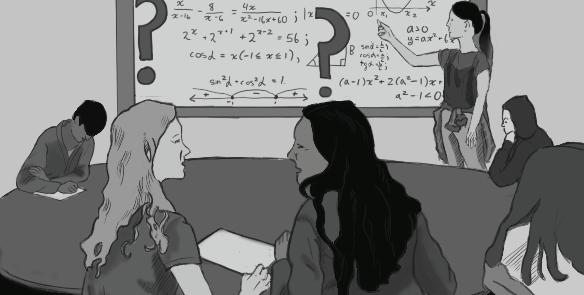
At Masters, PBL is a fundamental aspect of the learning process. Our math department is recognized throughout the New York independent school world as a leader in this fieldthey ran a sold out seminar to teach other teachers how to use the PBL method in math.
Marianne Van Brummelen, the head of the Math Department here at Masters, said, “I think PBL also is really beneficial. You have to really think about how you communicate your thinking and what are the ways in which you can make your thinking and your own thinking process more clear to your peers.” With this, it can be taken into professional fields of work. Van Brummelen said, “Problem based learning for me is more has a higher level of transfer to life and to anything that requires that kind of thinking.” Even beyond math, Van Brummelen explained, “If you’re faced with a question, whatever it is, the thing you’re asking yourself is, what do I know that applies to this?”
Here at Masters, PBL is just as vital. Math teacher Ian Mook said, We’ll work on something where a result of the problem is not just the answer, but a understanding about some new piece of content that came up in the process of doing the problem.” With this, I stand by PBL. It has helped me grow as a learner in and out of the classroom and to me, it is the part of the Masters learning experience that makes students a power for good in the world.
TOWER/FEB. 3, 2023 OP-ED 7 MATT IVES/TOWER
Aurora Rose Horn argues that reality TV shows aren’t real and are actually staged for dramatic purposes.
AUROR
GISELE CESTARO Lead News Editor
GISELE CESTARO AND JOSH Markowitz views con ict when it comes to problem based learning. According to Cestaro, PBL doesn’t work for everyone but Markowitz argues that it helps students become better problem solvers.
ELLIE SCHALKWYK/TOWER
SYDNEY STARKEY/TOWER
ARE WE OBSOLETE?
The Dangers (and Advantages?) of Artifcial Intelligence
Artifcial Intelligence Cybersecurity: Keeping your Introduction
In 1968, American novelist Jim Berry predicted the following in his article “40 years in the Future”: Most schooling – from frst grade through college – consists of programmed TV courses or lectures via closed circuit. Students visit a campus once or twice a week for personal consultations or for lab work that has to be done on site. Progress of each student is followed by a computer, which assigns end term marks on the basis of tests given throughout the term. Now, nearly 60 years later, with the aftermath of the COVID-19 pandemic still in effect, this prediction rings a familiar
tone for many students across the globe as online learning took over the past pandemic years. Alongside this, Berry also correctly predicted online shopping, credit cards, Apple Pay, vacuum robots, and more. However, reading through excerpts of his article, the tone it exhibits is reminiscent of that of dystopian novels; human interaction is replaced by internet presences and human workers are replaced by robots. Compared to Berry’s time, todays’ world is more advanced as tasks are made easier and more effcient by technology, but what are the implications of this?
Autonomous & Automated
As autonomous technology continues to invade jobs formerly occupied by humans, we begin to ask ourselves: are human jobs becoming obsolete?
As many businesses and corporations realize the capabilities and effciency of robotic applications, we begin to see the fear of robots taking over the world begin to come true.
Amazon’s breakthrough unmanned grocery stores opened in 2018, prompting a new system of buying produce. A highly programmed system was implemented into the grocery store’s technology that tracks shoppers’ movement, weights items in their shopping cart, and automatically pays for everything on an app, eliminating checkout lines.
But there is concern of allowing technology to have access to your credit card numbers, address, and other personal information.
Many people fear the rampage automated machinery is taking on many occupations. There
seems to be an unspoken consensus about the relationship between job loss and robot takeover.

In a recent 2022 study by Socius: Sociological Research for a Dynamic World, only 14% of workers say they’ve seen their job replaced by automatic machinery. Workers who have already been replaced with robots estimated that 47% of all jobs have been taken over by robots.
Many services have already been automated: customer service, data entry, market research analytics, and manufacturing are nearly fully autonomous.
But what people don’t understand is that automation creates jobs. For example, the implementation of ATM machines lowered the costs of opening new offces, leading to an increase in new offces, and allowing more employees to be hired.
While autonomous programming and automated machinery is being implemented into the routine tasks of jobs, it is allowing further development in numerous felds of work.
As technology continues to develop in our ever-growing modern world, the time comes where we say goodbye to outdated technology, and welcome this year’s newest online trends. The biggest theme being brought into the future is bridging the physical and digital world. With implementation of artifcial intelligence in healthcare and social media, it is becoming less robotic and more human.
Several types of AI are already being employed by payers and providers of care, and life sciences companies. The key categories of applications involve diagnosis and treatment recommendations, patient engagement and adherence, and administrative activities. Although there are many instances in which AI can perform healthcare tasks as well or better than humans, implementation factors will prevent largescale automation of healthcare professional jobs for a considerable period.
AI has already been implemented during minimally invasive surgeries, assisting a human surgeon which has resulted in decreased surgical errors, and increased patient recovery, but the full transition to surgical robotics has yet to be fully explored due to ethical implications, such as sudden malfunctions during surgery performance, or AI’s lack of knowledge of human functions.
AI is also taking over the internet: due to modernized technology, AI is now being used all over social media in
the form of “deepfakes.” These deepfakes can be seen impersonating many infuencers and celebrities, creating videos of them saying false information.
Bhavin Patel, director of technology, said, “I have been working with technology professionally for over 25 years, and the evolution of technology has been night and day since I started working. I used to teach workshops in college just to show students how to use email and the internet. Back then, it wasn’t a social, interconnected tool, it wasn’t about data harvesting. I think if users of the internet continue to use it this way, then it will continue to grow. However, if the people collectively say I don’t want to put as much of myself out there, then it has to scale down or adjust. So I think that it all comes down to responsible use.”
Many students own their own social media accounts, including Snapchat, Instagram, and Tiktok, all of which include some form of video communication, prompting opportunities for stolen identity through AI.
“I don’t think it’s going to take 3050 years for AI to take off. AI is already here. Even if it’s just asking your phone ‘hey siri, what is my favorite color’, it will probably look through your photos to see what color you wear the most and tell you ‘Your favorite color is green,” said Patel. Whether it be medicinal, educational, or personal use, artifcial intelligence has already infltrated many aspects of our everyday lives. The consequences of its use have yet to be determined as pos-
From spam risk calls, to texts congratulating you on a thousand dollar lottery win, to a new friend on Snapchat who appeared out of the blue, the practices of illegal activities increase with the advances of the technological world. Especially in recent years, cybersecurity has become an increasingly hot topic as well as a high-demand profession.
Walmart, the grocery store chain which has claimed the top place in Fortune’s Global 500 list for the 9th year in a row, has placed emphasis on its ongoing cybersecurity investments. With over 200 million weekly online shoppers, it turns to automated technologies for the protection of their customers.
At Masters, the technology team has also been faced with cybersecurity tasks as the internet developed. In particular, Head of Technology Department Bhavin Patel, expressed his desire to focus on technology awareness and education in the future. Patel said, “I believe that cybersecurity education is key. It is imperative for both students and parents to understand the implications behind having a smartphone. Technology is a part of our world; from the moment you wake up to the last news feed your check before you go to bed.”
As nations, corporations, schools, and many other organizations place a heavier emphasis on cybersecurity, the importance of protecting one’s personal online presence has also come to the
8 FEATURES & ARTS FEB. 3, 2023
ILLUSTRATION BY SYDNEY STARKEY
Intelligence and Technology
Cybersecurity: your online presence safe
forefront of many recent discussions.
From online shopping to creating a new email account, users are inputting their personal information into the internet on a regular basis. This information is then exposed to those who might be strolling through your page with a faulty intent. Patel said, “You have your real self, and you have an online self. People need to be aware of the kind of information they are sharing online. One thing that gets missed is asking yourself ‘why are these social media apps and services free of charge?’ You really are giving them yourself for free. You are giving them your joy, pain, fears, goals, and vulnerability – everything about yourself. So, I encourage people to have an inventory of what they have shared about themselves out there on the internet because once it’s out there, you have no control over where it does and you cannot take it back.”
Dayan Battulga, senior and member of the Masters cybersecurity team, also warned against cybersecurity breaches that may result from a single click. “Accept only necessary cookies, build up your fre wall, don’t go to suspicious websites, and things like that,” he said
Perhaps even beyond the physical tasks one can complete to protect their online presence, Patel believes the most important factor in protection against technology is being a responsible user
Oftentimes, the scale and consequences of being online could be lost in the convenience of picking up your phone and posting within a handful of clicks. He said, “If you wouldn’t be willing to be judged in a room full of 20 strangers, how are you willing to be judged by the entire world on the internet? This scale of where your information goes and to whom it reaches is lost with the internet.”
Although cybersecurity may be a concern in the current world of ever-advancing technology, corporations,
Q: What jobs will be replaced by technology in 10 years?
Warehouse workers
Cashiers
schools, and individuals have begun to recognize and place emphasis on the topic in recent years. Battulga also recognized the disparity between cybersecurity measures in the United States and other nations with less advanced technologies. However, he is optimistic when speaking about the future of cybersecurity. He said, “I think it is defnitely going to become much better. Technology is improving, cybersecurity will not only stop hackers but also prevent plagiarism and probably much more.”
“Green” screen
Another thing we are seeing an increase in is the destruction of our environment. Increased carbon emissions from motor vehicles, light pollution from overpopulated cities, destruction of nature to provide new factories and buildings, and much more. To combat this, a rise in “green” technology is being seen taking over many corporations and businesses.
Sustainable technology describes innovation that considers natural resources and fosters economic and social development. The goal of these technologies is to reduce environmental and ecological risks and to create a sustainable product. But in 2021–2023, a global energy crisis began in the aftermath of the COVID-19 pandemic in 2021, with much of the globe facing shortages and increased prices in oil, gas and electricity markets.
Yet, many corporations and businesses are working towards creating more sustainable products. Companies such as Dell and HP are revamping their approach to computer manufacturing by recycling ink and toner cartridges, and have reused more than 4.7 billion plastic bottles to create said cartridges.
Other approaches, such as LED light effciency and accessible solar power, are smaller steps that make a big difference in decreasing use of electricity and energy consumption. These changes have the possibility to be implemented into the Masters community as the popularity of sustainability continues to grow.
Green technology has the potential to revolutionize our public transportation and systems. Through steps such as reducing carbon emissions, increasing use of biodegradable and renewable materials, companies are able to use their re-
Customer service
Parking garage jobs
Teachers
Q: What items will be replaced by technology in 10 years?
Printed textbooks
Paper money
Physical newspapers
Home phones
Gas stations
AI presents promise and threat In the community
Artificial intelligence (AI) has the potential to significantly impact education in a number of ways. Some of the ways AI could impact education include: Personalized learning, tutoring systems, automated grading, and content creation.
However, it is important to note that AI is not a silver bullet solution and its implementation will need to be carefully evaluated to ensure that it is meeting the needs of students and the education system as a whole
That was ChatGPT’s response to the question, “How will AI affect education in the coming years?”
The rapid advancement of AI technology is likely to have major implications for the way we will lead our daily lives in the imminent future. Teachers and students alike must adapt to a world where AI is more prevalent than ever before, and choose whether the forthcoming technology revolution will change education for the better or worse.
ChatGPT, for example, has posed a threat to academic integrity in schools everywhere. Launched on November 30, 2022, ChatGPT is a chatbot which engages with users casually and conversationally, answering complex questions with supposedly the same ease as a human interlocutor. The service was developed by OpenAI, a company co-founded by Elon Musk.
As of January 6, ChatGPT has been banned across New York City public schools.
New York City education spokeswoman Jenna Lyle said, “Due to concerns about negative impacts on student learning, and concerns regarding the safety and accuracy of content, access to ChatGPT is
restricted on New York City Public Schools’ networks and devices. While the tool may be able to provide quick and easy answers to questions, it does not build critical thinking and problem-solving skills, which are essential for academic and lifelong success.”
The response by the New York City Education Department came quickly, but the consequent backlash came even quicker, as many AI sympathizers highlight that there are perhaps more productive ways to respond to the issue of plagiarism than outright prohibition of the new technology.
“When faced with a threat,” said John Chiodo, Director of the IEC, “big organizations often put up a barricade, then figure it out. And that tool that figures out whether text is written by an AI or not, that’s free. As much as AI may be improved, there will always be technologies and softwares able to detect cheating.”
Chiodo refers here to GPTZero, a software launched on January 2nd which can easily identify whether an essay was written by a student or an AI. The software is free, and was created by Edward Tian, a computer science major at Princeton University. In creating the software, Tian has explained that he hoped to curb concerns of AI plagiarism in academia.
The Masters administration has not yet released comments regarding the role of ChatGPT, or AI more broadly in our community, But its silence on the matter should by no means indicate a lack of engagement with AI technology among students and faculty.
In fact, students have turned to AI, most provided for by the free OpenAI company, to assist them in myriad academic tasks. Because of ChatGPT’s conversational nature and crisp writing style, the most prevalent of its uses has become essay writing. One Upper School student,
who preferred to keep their identity private, said “This fall they came out with ChatGPT and I started using it for simple English assignments, like paragraph here, paragraph there. It’s not good at variation of tone and style, so I’m not going to submit an entire essay written solely by ChatGPT, but it’s good for giving you ideas, or it can give you a paragraph, and you can edit it and make it your own.”
Of course, the development of AI has opened students up to a world of (albeit often morally questionable) opportunities to aid their academic endeavors. AI doesn’t exist in a ChatGPT vacuum, and many have discovered other uses for new technologies in their studies.
Another anonymous Upper School student reported, “I think that what’s been the most beneficial for me has been submitting my writing into AI and having it shoot back feedback, or sometimes I’ll ask it for comments on what I’m doing or for it to grade my work. I’ve given it characteristics of teachers to build feedback that I can expect to receive, and what I’ve found is that it’s immensely helpful to proofread for not just grammatical errors but for content as well, which is unique to this new AI program.”
Among faculty members, this rise in student use of AI has raised concerns similar to those expressed by the New York City School Board; namely, that ChatGPT is a tool which helps students engage in academic dishonesty.

History and Religions teacher Brendan Collins-Jordan said, “You know it’s funny. In some ways I don’t think it’s that different [plagiarism vs. extracting work from AI], actually. In some ways it’s really the same thing as if someone paid someone to write an essay for them, except it’s a computer doing it, and it’s free. And you can sort of catch it via the same mechanisms, and the biggest way is
just as teachers we know what a student’s writing sounds like, and we know when we get a paper that really sounds nothing like that student.”
But many teachers and students alike see AI as less of a threat and more of an educational tool, and it’s important to note that as AI expands in scope, so too do its potential uses. Just as AI can be used to help a student proofread a paper, it can help a teacher fill in an end-of-semester comment, or demonstrate a model essay.
“I don’t see this as a tool that’s 100% a problem,” said Collins-Jordan. “One thing I played around with is can you, like, fine-tune an essay with this. It actually works pretty well for that. So one thing that I’ve been thinking about is, I do think it could be an interesting tool to teach writing with, in that you have to know what to look for to fix it, and it can show you what a fix looks like. So I think it does have some pedagogical value as a tool that teachers can use in the classroom.”
There are also countless options to increase application of AI in STEM instruction, and Mr. Chiodo explains that there is particular room for growth in the realm of computer science.
He said, “Teaching students how to code, I find that often students will write it and then can’t find the correct answers. In this case, they can do it within a coding platform to get answers directly, instead of analyzing lines of code.”
AI is expected to soon affect nearly every aspect of human life, which means that it is decidedly up to the Masters community to figure out how or how not to carve space for AI in to the classroom. And perhaps, within these lines of 1s and 0s, there lies a real chance for educational improvement.
FEATURES & ARTS 9 ALEX A MURPHY News Editor
OBSOLETE?
#1 #2 #3 #4 #5 #1 #2 #3 #4 #5
shown in this graphic are results of an informal school poll.
WRITTEN AND DESIGNED BY ELLIE YANG & MAIA BARANTSEVITCH
*Data
U.S. Secretary of State visits Israel and Palestine amidst violence in the region
VIKTORIIA SOKOLENKO Staff Writer
On Jan 30, Secretary of State
Anthony Blinken visited Jerusalem to meet with Israeli prime minister Benjamin Netanyahu and several other members of Israeli leadership. A day later, he traveled to Ramallah to meet with Palestinian leadership, including president Mahmoud Abbas. Blinken’s visits come in the midst of escalating tensions in the region. On January 26, ten Palestinians were killed during an Israeli operation in Jenin, and just a day later seven Israelis were killed during an attack outside of the synagogue in East Jerusalem. Both attacks were among the deadliest in the region in the past years. The retalia-
tory violence that followed resulted in the death of at least 22 people over the last week.
The expectations for Blinken’s visits to significantly deescalate the situation were really low as the meetings were seen more as an attempt to contain the issue. Both Israeli and Palestinians met the visits with skepticism pointing to the US lack of interference and decisiveness.
During his visit, Blinken called for both Palestine and Israel “to stop the violence” in an effort to “restore a sense of security for Israelis and Palestinians alike.” He also reiterated the US support for a two-state solution and emphasized its commitment to “the goal of Palestinians and Israelis enjoying equal measures of freedom, security, opportunity, justice, and dignity.” During the press conferences, neither Abbas nor Netanyahu made specific calls to their people to restrain from violence. As part of his Middle East tour, Blinken
also met with Egypt’s president Abdel Fattah el-Sisi to discuss the rising tensions in the region. Before the tour, the Biden administration has already used Egypt’s help in mediating the cease-fires between Palestine and Israel.
While visiting Ramallah, Blinken has also promised additional $50 million in funding for the United Nations Relief and Works Agency that works to help Palestinians. This decision was met largely with disappointment as Palestinian leadership expected more extensive steps from the US leadership. Many Palestinians also hoped that the Biden administration would cancel some of the previous administration’s decisions such as closing the US consulate to Palestinians in Jerusalem and Palestinian mission in Washington.
While Netanyahu’s response during the joint press conference was more focused on Israel-Iran relations, Abbas elaborated
more on the escalating violence in the region. In his statement, Abbas blamed Israel for “ethnic cleansing and apartheid” and recent escalation and condemned the international community for allowing it to happen.
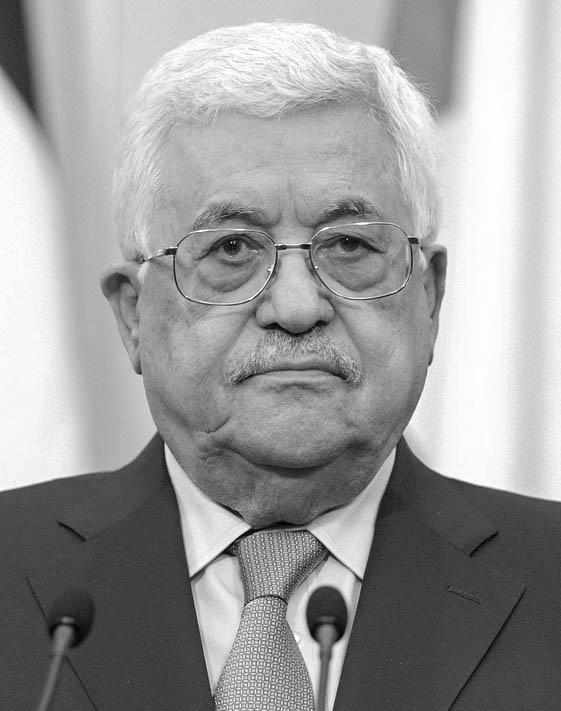
Apart from increasing violence, the visits also occur at the time of rising opposition to the government both in Palestine and Israel. Accused by Palestineans of corruption and cooperation with Israel, Abbas remains unpopular in Palestine with armed groups of young Palestsinians growing in numbers and power. Meanwhile, in Israel protests erupted in response to several decisions of its newly-elected far-right-leaning government, including the proposals to change the judicial system and introduce more punitive measures against Palestinians. The Israeli government’s response to the attack on January 27 was also met with mixed reactions.
Exploring Ben-Gvir and extremist Israeli policy An Israeli perspective
A call for Palestinian freedom
While I believe that Israel has the right to exist and defend itself from the terrorist organizations such as Hammas and those who wish to see it perish, I also condemn the past and recent injustices carried out by the Israeli government against its Arab citizens issued by right wing extremists. Because, like any other democratic nation, criticism is essential for progress.
Unfortunately, the complex and nuanced struggle between Palestine and Israel has been trivialized into western dinner politics by those who want to be on the right side of history, but do not have the wherewithal to know that that is virtually impossible.
If I could go into a 300-page spiel about the worldwide oppression of the Jews and the signifcance of Israel, I would, but I can’t, so I’ll summarize: The idea of the “Jewish State” was crafted in the late 19th century from Theodore Herzl as a response to anti-semitism creeping in every corner of the globe. According to Herzl, the only way to escape anti-Semitism was to create an asylum for Jews. This ideology became especially prominent after the Shoah(Holocaust) because Jewish refugees before, during, and after the war were denied entry into countries that would protect them from Hitler’s genocide and antisemitism. Modern propaganda that antagonizes all Israelis as “colonists’’ fully denies the 3000 year struggle of the Jews and should be labeled as anti-Semitic.
Unfortunately in the past 74 years of Israel’s existence, Palestine has been subjugated to poor leadership which has put them in a precarious situation of being an unrecognized state.Their leadership screwed them out of a land deal in 1948, and in 2022 under the right wing terrorist organization Hammas has used their citizens as human shields as means of defense.
Therefore, I must admit that I was disappointed that the progressive Yesh Atid party, led by Yair Lapid, that was elected as an Arab-Israeli coalition, was replaced by the
right wing Likud Party, led by Benjamin “Bibi” Netanyahu in November 2022. In creating a coalition, Netenyahu has appeased ultra religious and extremist right wing members of the Knesset(parliament)to convince them to join his government. His coalition now includes a range of very troubling conservative members, including Ben Gvir, a racist who is now Israel’s national security minister.
Gvir joined the terrorist Jewish Supremacy Kach movement at 16 and was not permitted to be drafted in mandatory IDF service that all Jews must enter, because of his extremism. Gvir worked to release Yigal Amir, the assassin of prime minister Yitzak Rabin, who said Rabin wanted , “to give our country to the Arabs.” Additionally, he hung a picture of Baruch Goldstein, an American Israeli who murdered 29 Palestinian worshipers in Hebron, 1994. Ben-Gvir is also the architect of the xenophobic 2022 ban of fying the Palestinian fag in Israel.
I am also disappointed to see how in addition to putting questionable politicians in high ranking positions, questionable policies have been proposed that threaten Israel’s democracy.
In an exclusive interview with Tower Professor Michal Gal, Israeli citizen and world renowned antitrust lawyer, said, “We are scared of losing what we built for many years now which is the incredibly surprising and well-functioning democracy. It’s the only real democracy in the Middle East and for years it had its own checks and balances that, unlike the US, does not have a written constitution.”
In recent weeks, massive protests have erupted across Israel in response to Netenyahu and his coalition for proposing to limit the power of Israel’s judicial branch. By issuing an override clause and removing its “Reasonableness Standard”, many are worried about the impact they will have on Israeli democracy.
Gal explained that in Israel part of their checks and balances includes the concept of reasonableness. In Israel the process called “Bagaat” gives citizens the right to go to the Supreme Court, which acts as a semi-constitution-
al or constitutional court, and request that they check the reasonableness of a governmental action.
Gal noted the consequences of removing the “Reasonable ness Standard”. She said, “If you harm equality in a way that is unreasonable you might not have a claim. If there is a law that imposes a tax that is completely unreasonable, you won’t have a claim or you will have a weaker claim.”
In regards to the Override clause, the re percussions could be enormous. In Israel the Judicial Elective com mittee evaluates who is deemed qualifed for a seat on the supreme court. The Over ride Clause would give unprece dented power to the government by giving them au thority to overrule su preme court decisions with a majority of 6159, the lowest possible majority in the Knesset. This system would model the dysfunc tional American sys tem for selecting judg es and would politicize Israel’s Judicial branch Preserving democ racy in Israel is imperative, however, ensuring a holistic democracy should be a priority for the Knesset. Gal said, “Democracy is about government based on the majority, but there is a second part: protecting the minority and creating trust in society. If we forget that part, then the whole social fabric comes apart. And that’s part of the feeling right now in Israel: That the social fabric is falling apart.”
Just three weeks after assuming power, the extreme right wing Israeli Minister of Defense Itimar Ben-Gvir unveiled a new policy in early January that promotes the ethnic and cultural erasure of the Palestinian people that can be considered a form of modern-day colonization.
Ben-Gvir has instructed all police and Israeli Defense Force (IDF) soldiers to remove Palestinian flags from all public spaces. This policy comes just weeks after a law was put in place that makes all the Israeli police direct subordinates of Israel’s minister of defense. The prohibition of the public flying of the Palestinian flag is currently in effect in Israel and Israel-occupied Palestine. Israel has no lawful right to occupy or have jurisdiction over Palestine, according to a recent study by the United Nations (UN) which calls Israel’s occupation of Palestinian territory, “unlawful under international law”. However, with little to deter Israel from moving further into Palestinian territory and enforcing its law banning the display of Palestine’s flag even within Palestine’s own borders, this policy and its enforcement could agitate an already intense situation leading to more attacks from both sides.
This policy is not surprising considering Itimar Ben-Gvir’s background. Ben-Gvir is a well
documented racist anti-Arab and a convicted criminal in Israel. In 2007, he was convicted for inciting racism and supporting terrorist organizations and is known for his racist chants like, “Death to the Arabs’’ and holding up signs saying, “Expel the Arab enemy.”
In 2022, Ben-Gvir even gave a speech in honor of Rabbi Meir Kahane, founder of a known terrorist organization, the Kach Political Party. He gave this speech eight years after the Kach Political Party was classified as a terrorist group by both Israel and the United States after one of its followers, Baruch Goldstein, massacred 29 innocent Palestinians worshiping in a mosque in Hebron and the party came out in support of Goldstein’s heinous actions. If one still has doubts about BenGvir’s views of the Arab community, Ben-Gvir even had a portrait of the mass murderer, Baruch Goldstein, in his living room.
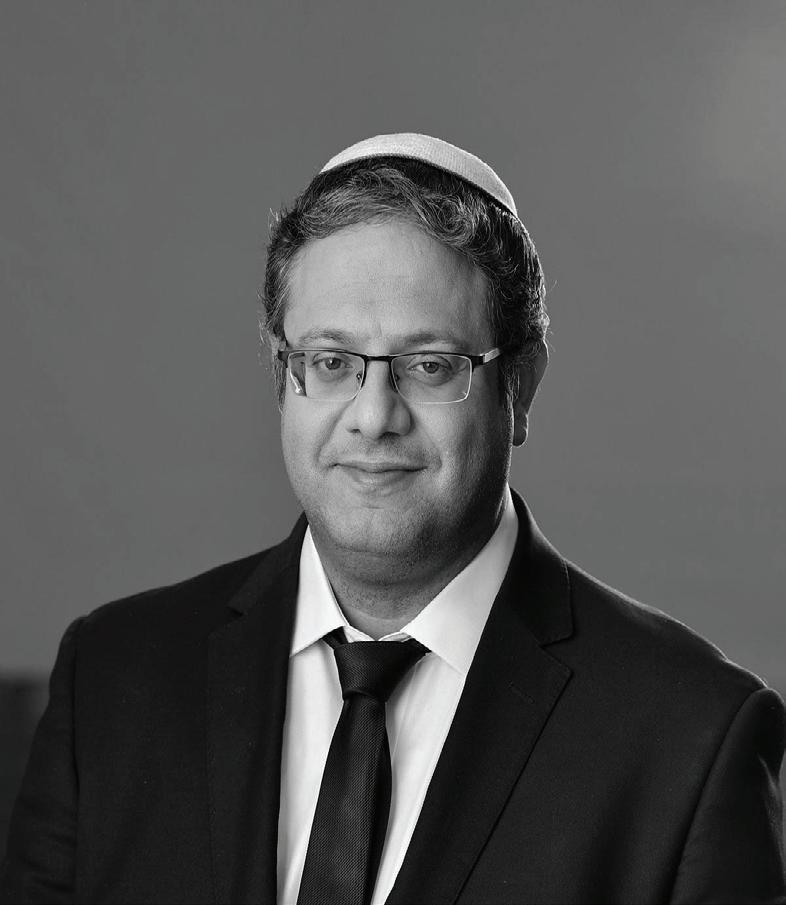
The continued anti-Arab policies of the current Netanyahu administration is another step in the wrong direction when trying to find and maintain peace between the Palestinian and Israeli people. By taking away a flag that symbolizes the struggle for independence and statehood, the Israeli government is also attacking the Palestinian people’s freedom, identity, and freedom of speech. This, in my opinion, is the coup de grâce, the last straw. Due to this, potential hope for peace has been diminished and will only escalate ongoing conflict.
A two-state solution is the most ideal and obvious solution for these countries, which are constantly in conflict due to many factors, including Israel’s constant colonization and aggression against Palestinians and laws such as the ban on the Palestinian flag that diminish the Palestinian presence and culture.

Naturally, Jewish people deserve their own promised land that is a safe haven for them, but so do Palestinians. Palestine deserves the same basic rights, freedom, and liberty that the free world has.
No one country is more entitled than the other to be safe from fear, retaliation, illegal oc -
Palestinian and Israeli leadership
Itamar Ben-Givir was born in Mevaseret Zion.
Ben-Givir is currently the Israeli Minister of Defense and is a part of the Jewish National Front party.
Ben-Givir serves as a member of Prime Minister Benjamin Netanyahu’s farright cabinet. He is a convicted criminal in Israel for inciting racism and supporting a terrorist organization.
Mahmoud Abbas was born in Safed Palestine. He is the president of the Palestinian Authority (PA). Abbas has served as the president since 2005. Abbas has spearheaded the Palestinian eforts to fnd peace in the region, though both sides have failed to fnd common ground.
cupation, displacement, violence, and instituting laws that are illegally enforced and sow the seed for continued war and bloodshed. A two-state solution could eliminate all of this unnecessary aggression and violence, resulting in peace for all parties involved, if these agreements were maintained and adhered to by both countries. Banning the public flying of the Palestinian flag, especially in land that is legally Palestinian, is just the latest example of the Netanyahu government’s continued aggression against Palestine and its people. The current Anti-Arab and far-right policies make that peace and stability through a two-state solution impossible to achieve.
In 2013 Barack Obama was quoted saying, “It is not fair that a Palestinian child cannot grow up in a state of her own, and lives with the presence of a foreign army that controls the movements of her parents every single day. It is not just when settler violence against Palestinians goes unpunished. It is not right to prevent Palestinians from farming their lands; to restrict a student’s ability to move around the West Bank; or to displace Palestinian families from their home.”
Though former President Obama clearly supported the Palestinian people, neither his administration nor any other future administrations have come out to recognize Palestine as its own independent state. The United States should follow suit with the United Nations and 139 other countries in order to support Palestine and its people and truly work to create a viable two-state solution. This could potentially be the catalyst to brokering long-term peace in the region.
Write to your local officials, spread awareness of these issues, protest all the Israeli government’s anti-Arab policies, and make your voice heard. Let us all come together and stop this erasure of the Palestinian people and promote the possibility of peace between these two countries.
Someday, may Palestine be able to find peace within their rightfully deserved borders and be able to freely raise their flag again with pride.
Benjamin Netanyahu was born in Tel Aviv. He is the prime minister of Israel and has served from 19961999, and from 2009- present day. Netanyahu is Israel’s longest serving prime minister in it’s history. Netanyahu is known for his extreme right-wing ideologies and right-wing cabinet.

10 OP-ED TOWER/ FEB. 3, 2023
News:
Creative Commons/ www.kremlin.ru FLICKR/ Manuel Lopez Creative Commons/ עברית
Artwork by Chana Kim
LYDIA ETTINGER Social Media Manager
MATTHIAS JAYLEN Opinion Editor
How Masters’ NYC neighbors are helping migrant workers
 AlexA Murphy & lydiA ettinger
News Editor & Social Media Manager
AlexA Murphy & lydiA ettinger
News Editor & Social Media Manager
At Port Authority Bus Station in Manhattan, New York, barricades surround the waiting area, lined with soldiers deployed from the National Guard. Lines form in front of tables where just a few volunteers sit to meet them. Depending on the time of day, there’s breakfast, lunch, dinner, or snacks to distribute, and books and toys for children to enjoy.
Since August 2022, buses flled with scores of mi
Abbott, governor of Texas, continues to send them.

Throughout 2022, the United States saw record-high immigration levels as a result of political and economic turmoil across the Western Hemisphere. Cubans, Haitians, Colombians, and Venezuelans, among other migrant groups, are crossing the border in droves, as over 250,000 have searched for security they require in resource-lacking and often wartorn home countries and regions.
A signifcant decline of COVID-19 and a seemingly immigrant-friendly Biden administration served as a glimmer of hope for these asylum seekers, and many were even more encouraged by the discussion of revoking Title 42, a

allows border authorities to send migrants back to Mexico upon capture. But upon arrival, Texas border offcials have not been receiving migrants with open arms. Instead, they received migrants with buses. As early as April 2022, over 7,400 migrants were sent to Washington DC. By Aug. 2022, over 1,500 had been sent to New York City. More continue to arrive daily.
Busing immigrants to New York City was a political power play by Abbot, a Republican governor. In a statement, Abbott said, “I hope [Mayor Eric Adams] follows through on his promise of welcoming all migrants with open arms so that our overrun and overwhelmed border towns can fnd relief.”
organizations from all over NYC have poured in to assist incoming migrants. In the sectioned-off portion of Port Authority, migrants are seated while members of the National Guard stand around the perimeter to secure the area. Fold out tables are scattered while volunteers hand out coconut water and bread to those waiting for legal assistance, and the Team TLC clothing assistance group assembles. Volunteer group Team TLC NYC is one of the many initiatives serving a wide range of migrants, from those who just got off the bus to those who are more acclimated. Part of their mission includes being a friendly face that migrants can rely on for food, medical and legal resources, and clothing.
Asylum Seekers I d I n g
Gunnery Sergeant Soto, an offcer deployed to Port Authority, explained the mission: “We have several different resources we offer here. Once they [the migrants] arrive from different parts of the world, we receive them, we give them shelter if we need it. We work with the volunteers here, give them food, clothing, and we ticket them, if they want to go to a different city. And we work with various city offcials to help as much as possible with their stay here in New York.”
In fact, one of the chief components of TLC NYC’s strategy is the idea of continued support. With a consistent supply of volunteers and professionals, hot and ready meals daily, and a wardrobe full of used clothes available for pickup, migrants are encouraged to return to the bus terminal as long as they require TLC’s assistance.



But one of the foremost issues, critics argue, is that migrants are
too often put in a position where they have no choice but to return to the bus terminal. Self-suffciency is impossible so long as resources are short and migrants are held in citizenship limbo. According to the UN Refugee Agency, asylum seekers must wait 150 days to fnd out if their asylum has been granted, after which they must wait another 30 days to attain a working permit.
Activist and former city council member Ruth Messinger is one of those critics. “In my time in government, I was very often critical of what the government wasn’t doing right. There’s no doubting that 31,000 people coming into the city in six months with no resources is a huge challenge—but we’re not meeting the challenge. We’re [TLC NYC] meeting the challenge, but the city is not meeting the challenge.”
If she were in charge, she continued, “I would fgure out what’s needed to negotiate with the federal government to get these people working papers right now. These are all men who want to work. Every immigrant who walked through there, walked through six countries to get here; they want to work.”
But the Biden administration’s lack of direction in regard to immigration policy has brought on a palpable sense of hopelessness among reform advocates. Although many hope for such sweeping changes, the fact remains that citizens currently hold very little patience and faith in the federal government.
Upper School Spanish teacher and resident New Yorker Roberto Mercedes said, “It doesn’t matter if we have Democratic or Republican administration in the Congress or the White House, immigration policies have been erratic. One day the solution is to build a wall, and another day the solution is massive deportation. The reality is that we still have millions of families living and working in the shadows because the US has not provided integral immigration reform.”
Ultimately, the hindrance in providing effective immigration policy lies in systemic failure. It is thus left up to organizations and individual communities to fght for the rights of migrants as they enter the United States and become Americans.
New teachers’ profles

Ian Mook, Math Department
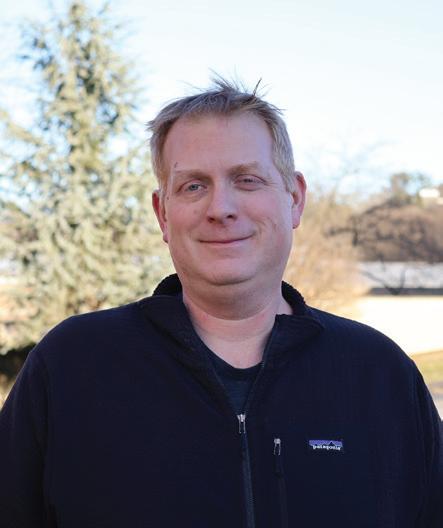

“He brings a really great energy to his classes into the department, and just comes with a lot of enthusiasm…it’s like a fresh perspective on things.”
- Marianna Van Brummelen, Math Department Chair
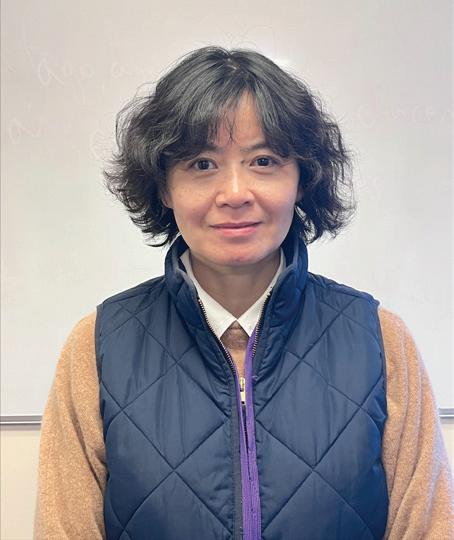
Director of Theater Tech

- M’kaela Riley ‘26’
“I absolutely believe McCoy and I have an impact, even if it’s a small one, on the kids that pass through the library and like to spend time with us.”
“I would say two things that I think she’s been a real role model for [is that] she is creative with technology. And earlier in the fall, she did a demo for it at a department meeting.”
- Jonathan Karpinos Language Department Chair
TOWER/FEB.3, 2023 FEATURES 11
O R D E R O N L I N E W W W M E X C H E S T E R C O M 1 3 C E D A R S T R E E T , D O B B S F E R R Y F A R M T O T A C O ! C E L E B R A T I N G 1 8 Y E A R S T M
VOLUNTEERS SORTING THROUGH BINS of used clothing to be distributed among asylum seekers at Port Authority. TLC has of cially stopped accepting donations due to large in ux of clothing in their inventory. Migrants must ll out forms consisting of their age, size, and gender to receive their items.
LYDIA ETTINGER/ TOWER
Peter Wylie,
and Lighting Design
Valerie Blain, New Assistant Librarian
Penny Peng, Language Department
“He’s kind of like the uncle of everyone in Mainstage.”
Please visit https://tower.mastersny.org/ for all new teachers’ profles.
Newcomb stops senior mid-speech, leaves Masters community speechless
at Ohio for the infamous 1969 Cuyahoga River fre, noting “one of Ohio’s biggest cities, Cleveland, the river caught on fre. How on Earth does the river catch on fre?...It’s horrible.”
On Dec. 14, the Upper School community sat in shock as Head of Upper School Peter Newcomb walked down towards the podium where senior Ben New was delivering his senior speech and whispered a message into his ear. New had been forced to stop. As the senior returned to his seat, the audience erupted in celebration and gave him a standing ovation.
According to an informal Tower Instagram survey, 87 percent of the 179 people who answered said they did not approve of Newcomb’s decision to cut New’s speech short. “In the moment, it caught me off guard.
Mr. Newcomb said to me ‘You have to stop your speech, but you can go again.’ I was thankful that I could get a second opportunity,” New said. As a member of the Morning Meeting tech team, New usually stays behind the scenes, ensuring that all of the technical aspects, including presentations, videos, sound, and lighting, run smoothly. But this time he was in the spotlight, literally. New’s speech was a humorous look at stereotypes regarding certain states and cities, namely New Jersey, Ohio, and Oklahoma. For example, New took a dig
Newcomb told Tower, “[I] was really trying to see where it was going, to see if it was going to pivot away from where it had started, and to give a little bit of grace and trying to fnd that balance as to is this headed in a direction that feels like it would be OK because right now it’s not feeling that way. And so, when it didn’t turn, apparently at Oklahoma, is when I went up.”
In his four years as Head of Upper School, Newcomb said this was the frst time he had ever stopped a senior mid-speech.
Last year, Finn Alexander ‘22 used the senior speech platform to not only celebrate his years at Masters but also to communicate his frustrations with the Masters administration following the expulsion of his twin brother and fellow student, Mac. Newcomb said that it never crossed his mind to stop Alexander’s speech or any speech regarding comments in response to the administration. “I think it’s important that students have the space to challenge [school decisions],” he said.
The senior class dean is responsible for reviewing senior speeches prior to delivery. Class of 2023 Dean Darren Wood said that
New’s satirically-written speech was a diffcult tone for which to read and he recommended multiple changes about purpose and audience impact during the review process.
“I think there were a number of moments [in his speech] that, looking back, I don’t think I fgured out quite right,” Wood said.
“The reason that I went up and chatted with Ben at that moment was to protect the students and the community members that were either from those states or that had family in those states,” Newcomb said. “[Ben] was in a really hard position and a confusing one because there was a disconnect between Mr. Wood and myself. I think Ben did a really great job of navigating that public diffcult moment.”
Senior speeches are a unique opportunity for Masters seniors. While Wood said that there is no prescribed subject matter for speeches, he said that students are encouraged to consider speech purpose, tone, and how it will land with different audiences. Traditionally, students have used this time to share advice or a memorable experience while at Masters, to express gratitude for someone, or to refect on a part of one’s identity.
Sophomore Molly Brooks said, “I fnd it interesting to hear different perspectives from the seniors at school because they’re our role models as we’re advancing through our high school years. But it can also get a little bit redundant because sometimes there is crossover between speeches.”
Senior speeches are three to four minutes in length and required to be submitted at least two school days in advance for review prior to delivery at Morning Meeting. Seniors sign-up in September to indicate their interest in delivering a speech, as well as their date preference. This year, ffty seniors have signed-up and Wood said that a few are currently on the waitlist.

Wood said, “I think you need to give some latitude to the kinds of speeches that students will write, and it is a tricky thing to know how to establish a criteria about what’s appropriate or not appropriate.”


New said that he received many questions following the conclusion of the Dec. 14 Morning Meeting about what Newcomb told him at

the podium. He also said that there was a mix of reactions to his speech from both students and faculty. While the reaction in the Claudia Boettcher Theatre seemed to indicate New’s speech was positively received, Newcomb said that there were community members who expressed concern and felt offended.
“I tried my best to say that I wanted to separate the people from the States and to make clear that it was more in a comedic tone. I do not have negative opinions about places that people are from,” New said Tower. “My intention was just to try to lighten the mood of this morning meeting and make it more of a memorable experience,” he said.
Junior Class President Arjun Ratan was surprised by Newcomb’s decision. “I knew [his speech] was meant to be fun and light-hearted, and I think Ben did a good job of proving that.” Ratan said. “The halt to his speech could’ve been handled differently, especially because the speech had been reviewed prior to delivery.”
Masters prides itself on freedom of expression and speech. As stated in the Masters mission statement, students are encouraged “to learn, to strive, to dare, to do — to be a power for good in the world.”
Newcomb said, “My frustration was not with Ben or with the process. I think part of what we do really well here [at Masters] is giving agency to students’ voices.” He added, “[Morning Meeting] is going to go off the tracks sometimes and that’s OK.”
FULL SERVICE COMMERCIAL GRADE CLEANING


SterileMed is leading the way in the new-age of cleaning by fusing technology with exceptional service. In addition to our traditional janitorial services, we offer innovative cleaning solutions with a strong focus on disinfecting and sterilizing high traffic facilities. Our leadership team has over 50 years of experience in the cleaning industry and is a preferred vendor to countless offices, major hospitals and big box retailers. Whether you run a small office, large building or even a warehouse, we can provide you with a customized cleaning solution to keep your facility running beautifully.


12 FEATURES TOWER/FEB 3, 2023
CHANA KIM/TOWER
LILY ZUCKERMAN & HANNA SCH ICIANO Features Editor & TBN Executive Producer
SENIOR SPEECHES ARE A tradition that has spanned across Masters’ history. The speeches are used to impart wisdom, comedic relief, or to share insights from the seniors. The rst senior speech this year was by Lauren Marlowe ‘23’.
77 Tarrytown Road, White Plains NY 10607 www sterilemed org Janitorial Services: Complete Maintenance Programs Disinfecting & Sanitizing Services Day Porter Services & Lobby Attendants Floor Care & Restoration Post Construction Clean-Up Window Treatment 24/7 Cleaning Services Industries We Service: Professional Office Buildings Residential Condo, Co-Op & Townhouse Developme Healthcare Centers Educational Facilities Children’s Centers Senior Housing Developments Retail Health Clubs & Gyms
“
My intention was just to try to lighten the mood of this morning meeting and make it more of a memorable experience”
- Ben New ‘23’
My struggle for intellectual honesty: homosexuality and Torah
Shabbat, or Shabbos, marks the seventh day of creation, the rest day, and takes place from sundown on Friday to sunset on Saturday. Growing up, Shabbos meant a time for family, my mom’s matzo ball soup, and general laziness. However, over the past few years, I’ve come to view Shabbos in a wholly different light: now, it’s a time to step back, breathe, and refect on all I’ve accomplished over the week. There is a special place in my heart for this break in time.
But last spring, something happened, something I haven’t let myself think about until now. For context, each Saturday morning during shacharit (the morning service), Jews read a passage from the Torah called a parshah, and because I couldn’t make it to services this particular morning, I listened to a podcast on the story instead. “Welcome to Parshat Acharei Mot,” said the rabbi. The podcast continued until I heard him exclaim, “do not lie with a male as one lies with a woman; it is an abhorrence.”
My body froze. I cannot describe how it feels to hear these words recited in my Torah; a book I have an enormous amount of love for, a book written by Hashem Himself, and a book according to which I seek to live my life. It was a gut punch that any gay or bisexual religious Jewish kid, whether open with their identity or struggling with it, has felt before. Typically, I attend shacharit, listen to the parshah, and later try to read some sort of rabbinical commentary on the portion. However, that week, I turned off the podcast and left Shabbos behind.
Several months later, though, I’m applying to a yeshiva in Jerusalem after Masters, so I think it’s time

I confront Parshat Acharei Mot again:.
If a man lies with a male as one lies with a woman, the two of them have done an abhorrent thing; they shall be put to death—and they retain the blood guilt. -Leviticus 20:13
First, let’s take a look at what the Gemara, a book that comprises part of the Talmud (oral commentary on the Torah), says about homosexuality. Yevamot 54b in the Gemara, an ancient Jewish text, suggests that ha’arah, the initial stages of intercourse, is enough for both men to be liable for homosexuality. Nevertheless, with this specifc passage, one must ask, “what is ha’arah?” Rabbi Shmuel says it is contact with the external organs often associated with sex, whereas Rabbi Yochanan says it is the moment anal sex begins.
When coupled with extensive Jewish legal writing about homosexuality, many contemporary Jewish scholars today hold the idea that the Torah only forbids anal sex between men. At the same time, the classical rabbinic view believes that most sexual intimacy between men is wrong. However, it’s unclear whether this is correct, and most halakhic legal scholars disagree with this assertion. Clearly, there’s been a lot of debate on the matter
Rabbi Yehuda, part of the Chazal, a group of ancient Jewish scholars, and editor of the Mishnah, noted in Masechet Kiddushin 82a that “Jews are not suspected of [engaging] in homosexual intercourse,” meaning that in his time, two Jewish men could, in fact, be together, as these tendencies were seen as innate.
Rav Yehuda might seem surprisingly neutral towards homosexuality, yet I still cannot accept his claim.
Did he forget that a ban on homosexuality is included in the sheva mitzvot b’nei Noach, or the “Seven Noahide Laws,” which were given to Noah by Hashem and supposedly bind all of humanity? Because Rav Yehuda’s argument is qualifed with the word “Jews,” he implies
that gentiles may still be suspected of homosexuality. This leaves me asking: if gentiles are suspected of homosexuality but cannot act upon it, then how could it ever be possible for gay Jews to act upon their urges?
Today, some scholars claim that because we know homosexuality is not
a choice, this halakhic prohibition does not apply to LGBTQ Jews in our era. Despite the fact that I am not the most well-versed in Torah (yet), I fnd their logic fairly arrogant. Has the nature of human beings grown that drastically in 2,000 years? I mean, I just can’t accept the idea that we have changed
that much, especially our uncontrollable primitive behavior regarding sex. While there is much more I could delve into, I honestly get the halakhic view on homosexuality. It may be uncomfortable to admit, but
I don’t fnd anything about this prohibition puzzling. Specifcally in the
context of Parshat Acharei Mot, what Judaism is trying to bring into the world makes complete sense to me. Intense rabbinical debates aside, some suggest that “wasting seed” is the reason for a ban on homosexuality, but that simply does not make sense to me.
Sexual expressions are encouraged in Judaism, and in the context of kiddushin, marriage is necessary to elevate one’s neshama–one’s soul–closer to Hashem. Even outside of procreation is sex within kiddushin sanctifed. Yet, Judaism offers no pathway for gay Jews to sanctify their urges.
So yes, in my view, homosexuality is not the ideal way sexuality should manifest itself, and it takes a great deal to admit that. But here I am–a liberal gay student who wants nothing more than to fnd a halachic basis for having a husband and raising a family when I am older while maintaining intellectual honesty at the same time. Despite all of this, I believe deeply that Hashem is my Divine Author–that I am who I am because of Him. If each of us is created in Hashem’s image, there must be some reason why He chose me to be gay.
At this point, I could easily turn away from Torah and religion entirely. Nonetheless, I feel strongly that Parshat Acharei Mot doesn’t exist to foster hatred of Judaism in gay Jews or hatred of LGBTQ people in straight Jews. I challenge everyone to use Acharei Mot as a reminder that life on earth is nuanced and that no situation is ever black or white. Like Judaism, almost every institution, whether it’s our family, religion, or schools, can present us with contradictory values that may make us uncomfortable or angry. Regardless, it’s imperative that we “zoom out” and try to see the world for all its parts. Ultimately, these situations make us ethical leaders, students, and citizens, and I know having the ability to do so can craft us all into powers for good in the world.
It’s time for RADICAL reconsideration: don’t get rid of comments, get rid of grades
not accompanied by a grade, and that attaching no feedback and only a grade to student work, fails to highlight the work they’ve done.
As the first semester ends this year, Masters students will, as per usual, meet with their advisors to discuss the progress they have made this semester, the challenges they have either overcame or continue to face, and the goals they have for the next semester. And per usual, students will be able to look over their report cards to reflect on each class. Unlike years (or even quarters) prior, though: Students will no longer receive written feedback from their teachers.
Masters often promotes itself as being progressive in its methodologies — however, removing written feedback threatens to undermine the positive work that Masters is doing. The lack of comments will change change the way students approach their work by sending the message grades and “content mastery” are more important than skill development or personal growth. The worry is that students will pursue work viewing only the grade as the end goal. Putting such an emphasis on grades with minimal explanation behind them will also discourage students from taking risks, out of fear that they will not be “right.”
Junior Caleb Tuckman disagrees with the new system.. He said, “that especially as a student who strives to continue to grow and do better, that to not have the feedback is frustrating. Especially because you just have a letter grade right in front of you, and don’t know why you got that grade.”
Tuckman’s frustration echoes studies that show that students
when
Ultimately, grades themselves fail to do what they are supposed to do and often undermine the positive work that, for example, the Masters English Department is doing right now by moving toward narrative feedback. Shifts to narrative feedback, according to students, allow them to understand on an individual level where they’re succeeding, and where to improve and focus. Grades are not needed - students can focus on their individual writing journey instead of conforming to necessary standards and examples.
Since not all students work in the same way, assigning the same grades to them all should thereby fall apart under any scrutiny. Why should a student who puts in hours of effort, comes in for extra help, and has improved tremendously from their baseline knowledge be defined by a letter grade corresponding to content evaluations? Why should students who show minimal personal progress be awarded an “A” if they perform well on assessments, without actually putting in any effort? Even if “this is the system we’re stuck with,” wouldn’t providing written feedback for students aid them in both interpreting the reasoning behind the grade, and informing them what they still need to work on?
Indeed, students find that feedback accompanying a grade allows them insight into what their grade is comprised of. Tuckman explained, “Especially if we’re being graded on things like participation in Harkness discussions, to not know where you stand on that and where you could improve with that, is frustrating.” Without feedback, teachers who base grades partial -
ly on participation, classwork, or other categories where students might not have seen letter grades throughout the semester, leave their students confused as to the reasoning for their grades. Aside from just students and teachers, parents will be impacted by this decision as well. Oftentimes, parents look to comments to frame their interpretations and expectations surrounding their student’s grades.
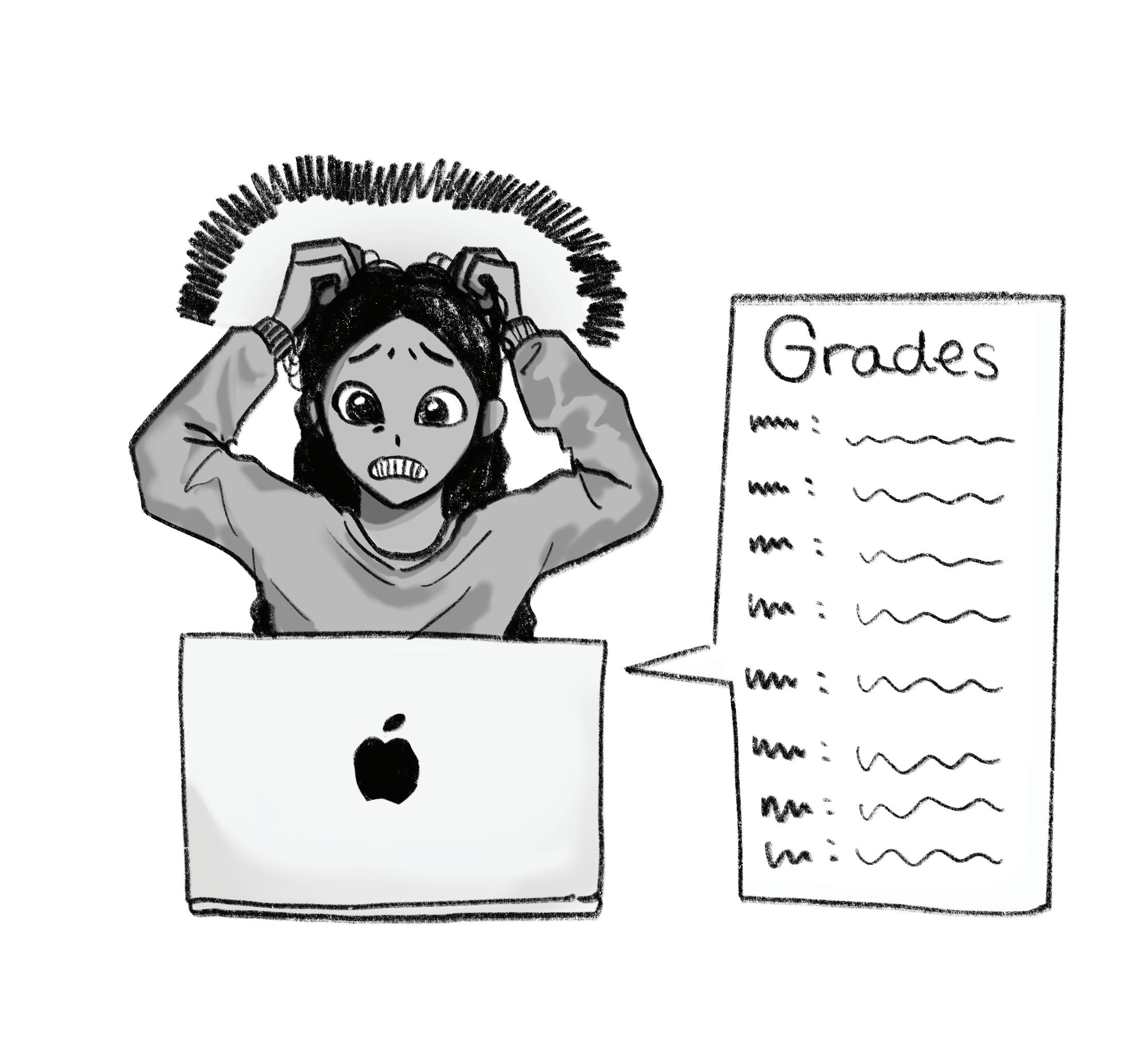
Junior Jonah Breen expressed his concerns on that matter, saying “I definitely can appreciate the comments that go along with the grades, I think my parents definitely like them, and it definitely helps us to figure out what I can improve on and what I’m doing well.”
I’d like to propose a counter solution. As Mrs. Thorn said to Tower earlier this month, “Studies show that when you give formative feedback with a final grade, the formative feedback isn’t as useful because you’re already saying, ‘This is the end, this is the grade.’” Perhaps our grading system isn’t perfect as is, but we only further perpetuate the negative end of this statement by removing comments altogether.
I propose that, instead of moving in this direction away from formative feedback, we move to a system of entirely formative feedback, and no more letter grades. While many people will disagree with this idea, and I can understand why, there’s no real reason for us to be using letter grades anymore. Letter grades are arbitrary. They attempt to sum up a student’s entire performance and assign one value to it. They reflect only on content mastery, as opposed to student growth in a class. And the only real reason
we’re still using grades is that it’s been the norm for over a century. Moving towards a more progressive idea, like all feedback, allows us to overcome the many issues of grading outlined above. It allows our community to move past the confines of an outdated, unfair, unnecessary institution that we’ve normalized. And it allows us to focus on what matters to many Masters students most: growing and learning from each other,
knowing that the effort you put in is seen. Parents would benefit too — being able to see the progress and specific weaknesses their kids display would be even more informative than just grades are, since these personalized feedback comments would address trends teachers have observed, and allow for more open conversation.
This idea is not totally unheard of, either. In fact, two Masters alums, Erica Chapman
and David Dunbar, cofounded an organization known as the DKDK project, which focuses on reforming educational institutions as we know them. Schools such as the Hawken School near Cleveland, among over 200 more schools, have begun testing out schooling without grades. The idea of moving past grades is not unheard of. It’s not radical. It’s the future we need.
וְאִיש אֲשֶׁר ישְׁכַּב אֶת־זָכָר מִשְׁכְּבֵי אִשָּׁה תועֵבָה עָשו שְׁנֵיהֶם מות יומָתו דְּמֵיהֶם בָּם׃
TOWER/ FEB. 3, 2023 OP-ED PG 13
ELI WEST DISCUSSES HIS EXPERINCE with the Torah as a member of the LGBTQ+ community. In this article West emphasizes the nuances in the Jewish religion.
internalize
feedback better
ELI WEST Blogger
XAVIER ROLSTON Web Editor
XAVIER ROLSTON ARGUES THAT Master’s grading is broken. In this OP-ED Rolston explores why elimating comments will be detrimental to student growth. Rolston fears that learning is being overshadowed by the pressure to perform.
CHANA KIM, JENNY XU/TOWER
CHANA KIM/TOWER
Jack Stevens finds his place
From admissions, to Gold Key, to JV boys basketball
Jack Stevens is often just seen as “that 6 ‘11 guy that works in admissions,” but he plays an important role in our community. He is Masters’ new associate director of admission and advises Gold Key. He is in charge of tours, interviews and a large part of this school’s admissions process.
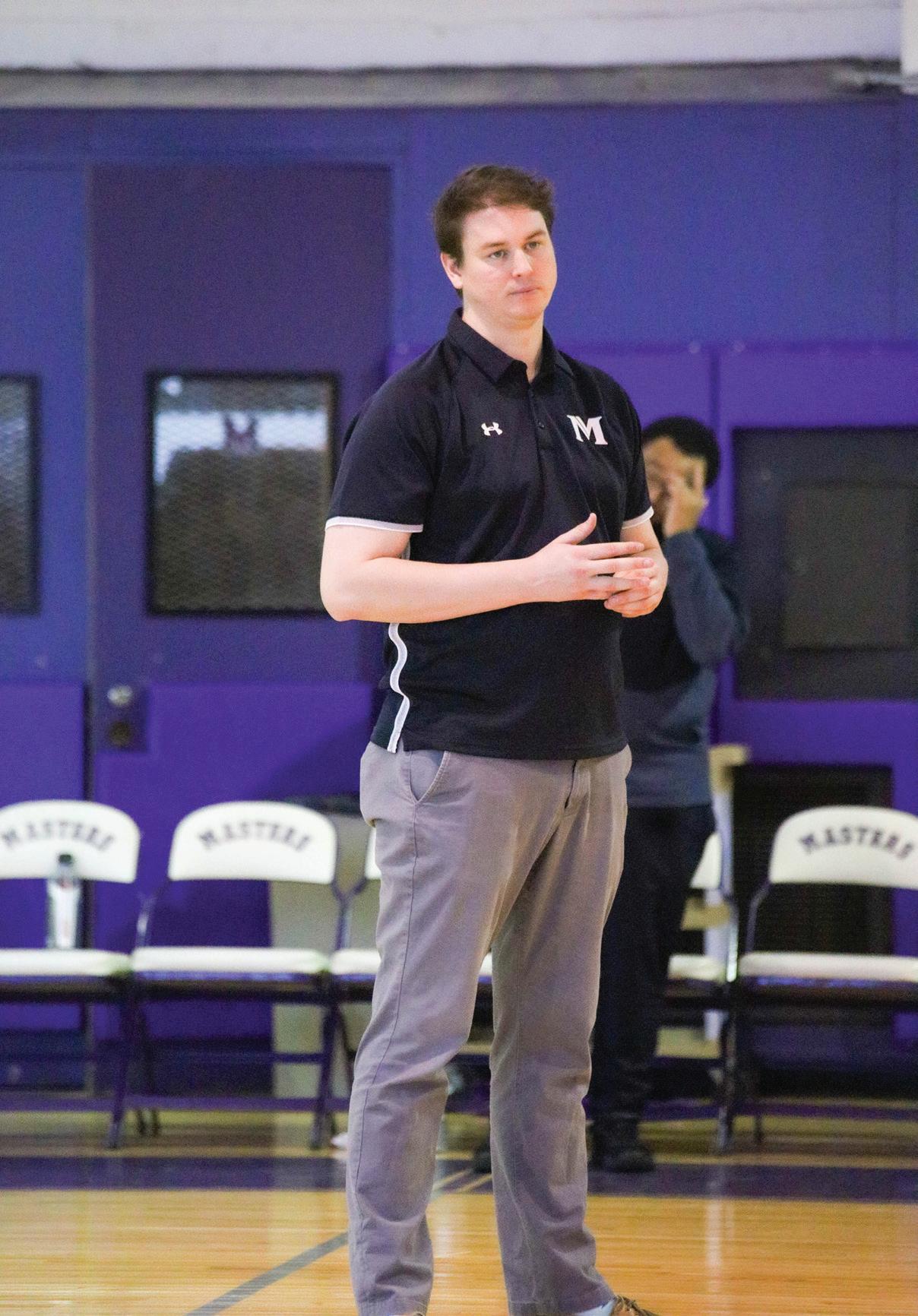
Stevens transitioned from Cardigan Mountain School in the rural part of Kanin, New Hampshire to the suburbs of Dobbs Ferry, New York. The school that he called home for one year was an all boys boarding school from sixth to ninth grade. He said, “I lived in a hall with 16 boys from all over the world. It was crazy.” Stevens has a lot of experience in admissions and at his old school, he ran something similar to Gold Key called Green Key. He was also a dorm parent, coach and advisor. Then, when COVID-19 hit, he had to take on some additional duties
and became a substitute teacher for classes that ranged from French to music to engineering. He decided to change up where he worked and moved to Masters after hearing about it from friends from his Alma Mater, Syracuse University He chose The Masters School because of the similarities it has to Cardigan Mountain School. In addition, he said he appreciated the clarity of vision he perceived. He said, “Everybody–from top down–during
er schools. He said, “I felt Masters was actually making the change, that they were actually moving forward, that they’re actually being honest and being authentic about what they were selling.”
Now offcially onboard, Stevens works hard to improve Gold Key and the admission process. He said, “I’m trying to create a program where Gold Key tour guides feel best prepared to represent the school in the most positive way.” He said he
“Mr. Stevens is not as scary as he looks and he’s pretty chill and understanding. He has a lot of respect for the work that we put in as part of Gold Key, whether leadership or not.”
my interview process was on the same page and I never got contradicting ideas of where the school is moving forward.”
He came to tour the campus on a sunny March day and said that was when he knew that this was the right place for him. In his opinion, Masters is very unique and different from oth-
- Caleb Tuckman
plans on achieving this by making sure there’s more accountability and appreciation for Gold Key tour guides and that they feel that they are making a difference in the school. He wants to create connections between tour guides and the students who are seeing the school. He said he is looking forward to meeting and training
more students in Gold Key.
Caleb Tuckman, a junior, and part of Gold Key leadership, frst met Stevens on one of the frst days of school. He said that his initial impression of Stevens was that he was “tall, very tall, and intimidating.” After getting to know Stevens, Tuckman realized that Stevens has a lot of respect for the students and treats them the same way he treats other teachers and staff.
Tuckman said he believes that the largest impact Stevens has on the school is that he is completely transforming Gold Key into something that has more guidelines to help the students and those touring the school.
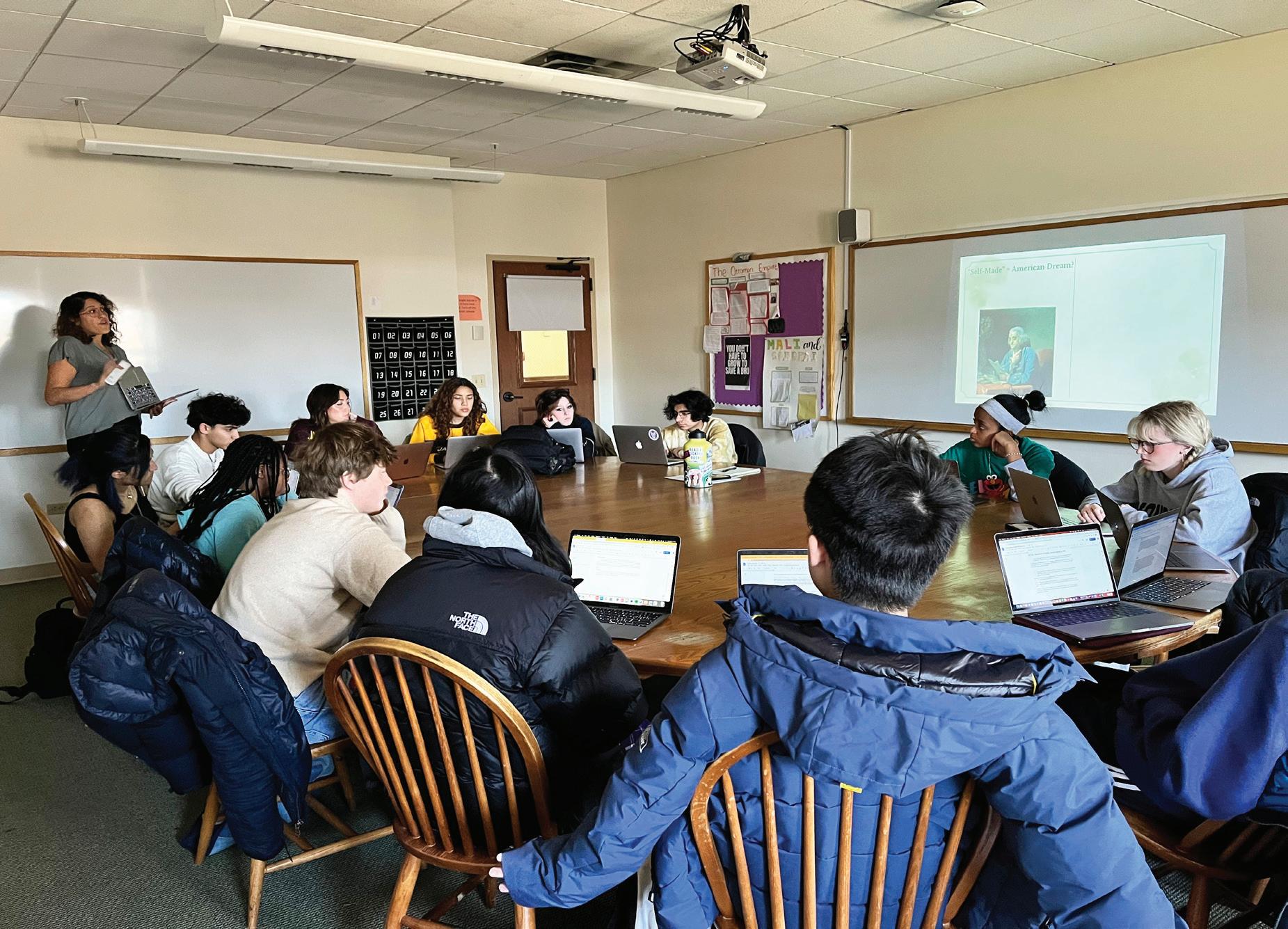
Despite his height and that he has a baseball bat in his offce, Stevens has proven he is down-toearth and approachable, and has made some meaningful connections. Tuckman said, “Mr. Stevens is not as scary as he looks and he’s pretty chill and understanding. He has a lot of respect for the work that we put in as part of Gold Key, whether leadership or not.”
Mariah Peña brings youthful perspective to the classroom
frst year of college, I was already learning teaching strategies and classroom management, and I really enjoyed all of it.”
Everything started in high school with the book Mirror by Sylvia Plath. The teacher told her to write a refection of about three paragraphs, but she ended up writing three pages. When she showed her notes to her teacher, the teacher suggested she should read her notes to the class and teach the class about the poem.
So began Mariah Peña’s discovery of her passion for the beauty of the English language and teaching, which eventually led her to become a teacher in the English Department at The Masters School.
“I saw my classmates get really excited,” Peña said. “ And they started raising their hands and said, ‘Oh, I found that too!’ and, ‘Oh, that’s really interesting.’ I got a rush from sharing something I knew I was good at, and I really loved, with my classmates and just bringing them something new and then learning what they learned.”
Saying that she loved being a student, Peña said being a teacher was the closest thing to continuing being a student and continuing to learn.Peña got into a fve-year masters program in college which started with the education of classes when she was a freshman. “That
With a dad from Ecuador, she grew up in a heavily Spanish speaking- infuenced household.
Peña said, “Spanish is not my frst language, but I think it’s one of the most beautiful languages and so I’m always trying to be as close to that as possible.”
She said that she is proud of her heritage and the frst person in her family to graduate from college with a masters degree. When she started teaching she wanted to make it very clear that having a Hispanic background is a big part of who she is as a teacher and having the perspective of the Hispanic woman in this world.
After college, Peña started teaching at a public school in New Jersey for eight years. While still teaching in New Jersey, she moved to Dobbs Ferry for personal reasons. She didn’t know about Masters School until she found it by accident when she was walking her dog.
“The second I walked onto the campus, I said, ‘This is beautiful!’ and it reminded me a lot of the high school I went to.” After doing some research and an intense application process, she started her job at The Masters School.
Peña said she felt included in the school community right away. She said, “This school, and everybody who works here, has done an
amazing job at making me feel supported. So it feels like a community.” Because she lives so close to the campus, she said, it feels like a second home. “But as far as the community I do feel like I’m part of a family now.”
Similarly, Peña talked about her relationship with her students. She said, “My relationship with my students seems to be the same, which makes me very proud. I think I’m good at connecting with students, or at least, I try to be, and that doesn’t change wherever I am.”
Sophomore Anna Moscato described how easy it is to relate to Peña. She said, “What is very nice about her as a teacher is she’s young and she has a perspective that’s similar to mine and she knows a lot of stuff that’s relevant to my life.” Moscato feels safe around her and comfortable sharing her opinion. She values that Peña is focusing on the things she has to improve through detailed grading and opportunities to work on that in class.
Moscato explained that in Pena’s class students have a journal for short entries in the beginning of the class which gets the brain going and gets the fngers typing. She went on to say that Pena assigns a lot of major writing assignments, and she supports students by dedicating some of her class to workshopping. Moscato described Peña’s class as one based on discussions about books and hearing what other people have
to say. Peña shared that when she was a student, she was the only Hispanic girl graduating from her high school. She said, “I didn’t have any teachers or friends that looked like me or had similar backgrounds and it didn’t really hit me right away when I started high school. It wasn’t until I
came across some people who would make, you know, racist comments or jokes that I started to realize that I didn’t have a safe space.”
She made it her mission to show her students that they can be educated, well-traveled and really be whatever they want to be with any ethnic background. “I think coming
here felt really good because I was kind of going back to a place similar to where I was when I was in high school, a predominately white institution, but I’m seeing a lot more students of color and diversity.” She added, “ I can also bring myself here now.”
Affirmative action case has potential impact on current students
scribed as “1960s levels.”
The Supreme Court began hearing arguments on Oct. 30, 2022 to decide whether colleges and universities can continue to consider race as a factor in admissions, a case that could signifcantly change the racial makeup of college classes in years to come.
Affrmative Action aims to combat racial prejudice by identifying the systemic obstacles that have prevented underprivileged students from accessing higher education. Race-conscious admissions procedures enable institutions to take a student’s race into account when making decisions about admissions, assisting in the development of a diverse student body. Targeted in this case are Harvard University and the University of North Carolina, who are accused of discriminating against white and Asian American students.
The practice of taking student background factors, including race, into consideration when deciding whether to admit an applicant originates from the civil rights movement in the 1960s.
The frst major affrmative action case before the Supreme Court was Regents of the University of California v. Bakke (1978). The court decided that a quota system was unconstitutional, but also ruled that schools have a “compelling interest” in the educational benefts of having a diverse student body, which
allowed them to consider race in admissions, so long as it was one of many factors considered. Other cases throughout the years such as Gratz v. Bollinger and Grutter v. Bollinger (2003) and Fisher v. University of Texas (2013 and 2016) have upheld the ruling in favor of universities’ ability to consider race as one of many factors in an individualized admissions decision.
In this most recent fling before the Supreme Court, the Plaintiff is Students For Fair Admissions, an organization founded by Edward Blum, who said, “What is happening on college campuses today is that applicants are treated differently because of their race and ethnicity.” The plaintiffs say the schools discriminated against white and Asian American applicants during the admissions process by giving extra preference to Black, Hispanic and Native American applicants.

Lawrence Bacow, president of Harvard University said in response that “At risk are 40 years of legal precedent and diverse campus communities that prepare students for an interconnected world… When Harvard assembles a class of undergraduates, it matters that they come from different social, economic, geographical, racial, and ethnic backgrounds... Harvard is
not alone in believing that we are more than our test scores and that our unique perspectives bring a wealth of educational benefts to a high-quality educational enterprise.”
A ruling on this case is expected this summer, possibly as soon as June. If the conservative court rules as expected in favor of the plaintiffs, the effect on schools will be far-reaching. In a Jan. 15, 2023 New York Times article, If Affrmative Action Ends, College Admissions May Be Changed Forever, Angel B.
Pérez, the chief executive of the National Association for College Admission Counseling said, “We will see a decline in students of color attending college before we see an increase again… We will be missing an entire generation.” A brief submitted by 33 schools asserted that “The probability of Black applicants receiving offers of admission would drop to half that of white students, and the percentage of Black students matriculating would drop from roughly 7.1 percent of the student body to 2.1 percent,” de-
Many schools have taken steps to broaden eligibility in anticipation of a court ruling against affrmative action. The move by many colleges and universities to make standardized testing such as the SAT and ACT optional, is one such maneuver. Standardized tests have long been regarded as biased and unfair to those students who cannot afford expensive test preparation classes. And test scores are the basis of lawsuits such as this most recent case brought by Students for Fair Admissions to argue that Harvard and University of North Carolina discriminated against White and Asian applicants. More than 1800 colleges have remained “test optional” since the pandemic, which has changed the landscape of college admissions.
Adam Gimple, Director of College Counseling at Masters, offered his thoughts on standardized testing, college admissions, and diversity. “I think the interesting piece to remember is that rarely, if ever does a school look at a candidate and say, ‘All things being equal, the one thing that’s different is race.’ Ultimately, when you’re talking about a candidate who is traditionally accepted to a highly-selective institution, more often than not, with a few exceptions, that student is highly qualifed and capable.”
Diversity in schools, historically speaking, was not always the objective. Gimple explained: “Part of the reason why standardized tests even got introduced into college admissions was to keep populations fairly homogeneous…
Diversity historically has always been a particularly challenging circumstance for higher ed[ucation] to navigate.” He went on to say, “Now, I also think that higher education is absolutely the placeholder in most young adults’ lives where they are exposed to different perspectives and different experiences and learn about oneself and how you ft into the huge cadre of different types of people and experiences that exist.”
“Places like Masters, its [diversity is] part of the ethos of this place. It’s part of the fabric in terms of how we operate, is trying to bring in different perspectives, different experiences, and we recognize and celebrate all different identities,” Gimple said.
Senior Charles Manzano said that he had a discussion about affrmative action in a 12th grade seminar. “In a book we were reading in my 21st century Black literature class, there was a scene where from the perspective of a Black woman was talking to a white woman and they’re both professors at this college and this white woman goes, ‘Oh, I wanted my son to come here, but ‘affrmative action.’
Manzano went on to say, “And so we had a little discussion about how there’s this unnecessary stigma about that... I think it’s both colleges’ rights to ensure that their student bodies are representative of this country and it’s also students of color’s rights to get access to a good education.”
14 FEATURES TOWER/FEB. 3, 2023
“
‘24
THE PRACTICE OF TAKING student background factors, including race, into consideration when deciding whether to admit an applicant originates from the civil rights movement in the 1960s.
COACH STEVENS WATCHES JV boys baskeball play the Harvey School on Monday, January 30th in Strayer Gym. Stevens played Divison 1 basketball for two years at the College of the Holy Cross. He rst started coaching during summer camps while in high school.
MARIAH PENA TEACHES A class of English 11 Seminars called Amercian Dream, American Nightmare. She teaches classes to ninth, tenth, and eleven grade. Pena enjoys the feeling of kinship at Masters.
ELLA BLACK Contributng Writer
JOSH MARKOWITZ/TOWER
ANGEL HENRIQUEZ/TOWER
JUSTINE PASCUTTI Ad & Distribution Managar
PHILINE HELLRIEGEL Contributng Writer
Colin Smith: Masters track star is also a “karate kid”
Mohegan Lake, NY to sleeps and repeat.
While Masters is known for its high-achieving student athletes and tight-knit sports teams, many Upper School athletes choose to opt out of in-school sports and play outside of school. Although Masters offers a diverse range of unique sports like fencing and squash, there is a limit to athletic spaces, amenities, and expertise to coach. However, some students have been able to explore sports both in and out of Masters, including sophomore Colin Smith; a two-season varsity athlete and first degree black belt in karate.
At Masters, Smith is a part of the Varsity Indoor Track team in the winter and Track and Field in the Spring. He began running in middle school, and decided to continue with it when he switched to Masters in ninth grade.
Smith spoke on what it is like to be a part of the track team.
“It’s an individual sport where you focus on improving your focus on improving your time.
“The biggest struggle [of practicing two intense sports] is the toll they put on my body,” said Smith. He continued, “A sport like track are already challenging by itself. After track practice I often lay down on the ground due to my exhaustion.” He continued, “Then I have to pick myself up and I can’t even make the walk down to the train station.” Smith said he has found a discipline from the two sports that motivates him to continue his journey in both.
Unlike track, which he picked up when he was in the seventh grade, Smith has been taking karate classes since he was three years old. Smith was inspired to start karate at this young age by his cousin, Tyler Smith, a third degree black belt at Go No Sen Karate, who is known to Smith as “Sensai Smith.” His cousin has seen his growth in karate throughout the years.
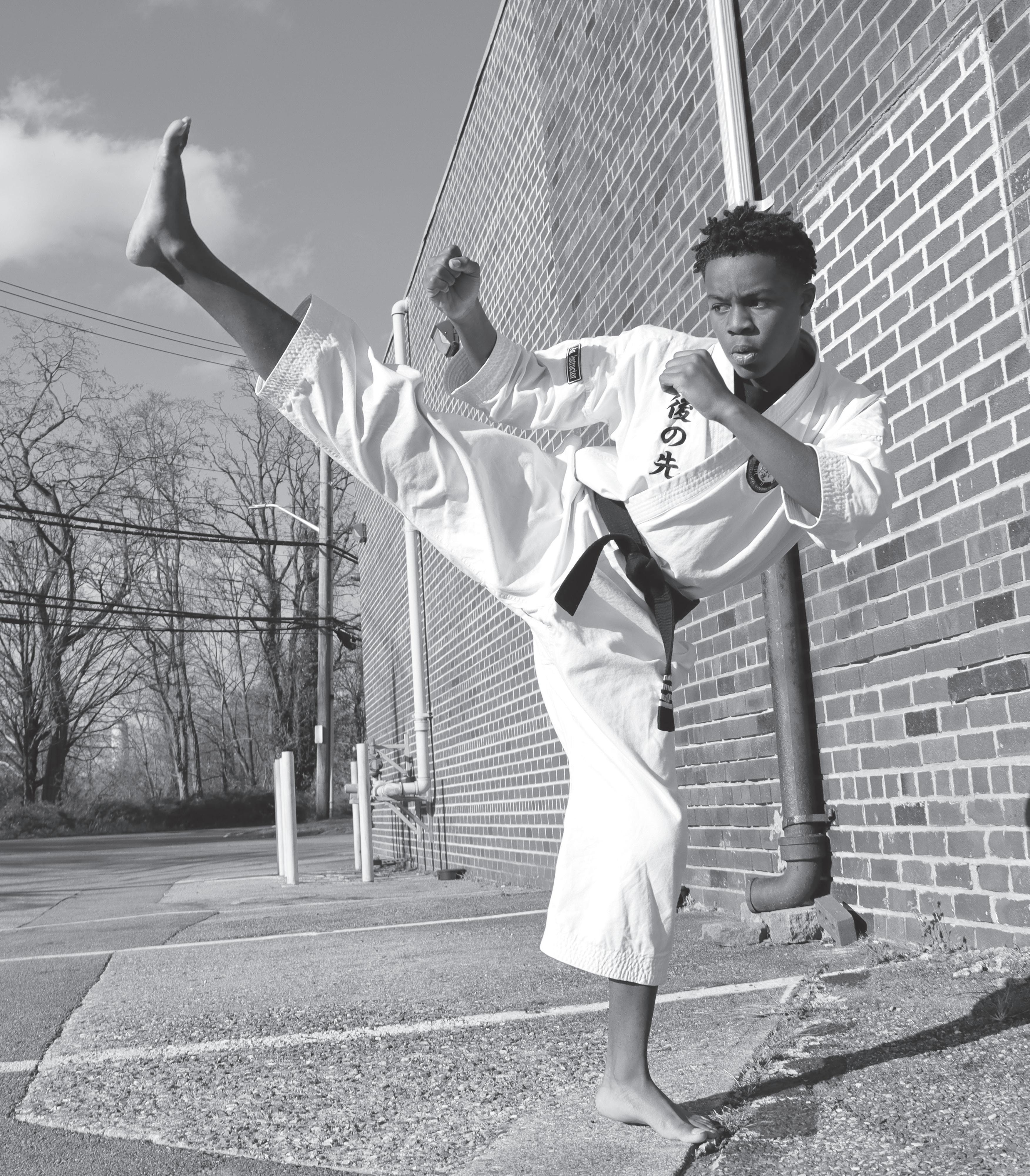
I’ve learned to cut back on some activities and find a balance between everything. I try and get my work done as soon as possible because I know that later in the day that will benefit me. There are times that I know I’ve worked hard in school, karate, and track and I can then give myself time to sit back, relax, chill and hang out with my friends.”
- Colin Smith ‘25
But at the same time, you’re always uplifting your teammates and always helping them out if they ever need a hand,” Smith said.
Smith has track practice everyday after school until 5 p.m. When its over, Smith heads to the Dobbs Ferry Train station to start his journey home. Then, on four of those five weekdays, Smith gets off the train in Peekskill, NY and goes directly to “Go No Sen Karate,” the dojo where he practices karate. After that, Smith heads home to
Tyler Smith said,“Colin started as a bright-eyed, bushy-tailed, small child. I remember vividly when he first started because it was around the time I was testing for my first black belt. He was excited about just donning his uniform and having his belt tied the first time.” He continued, “I believe that he still maintains that same passion and excitement even now as a Black Belt Instructor in training. He has grown to turn this passion into tangible results through constantly striving to be better today than he was yesterday. I would definitely say that he has evolved in this way over the years.”
Colin Smith’s biggest accomplishment in karate was completing his goal of receiving his first-degree black belt. In June of 2020, after logging 100 hours of practice, taking a written test (with 100 questions), and taking a four-hour
SOPHOMORE COLIN SMITH SHOWS off some of his karate skills. He demonstrates his talent and understanding for the art and his love for the sport. Throuout his years at Masters, he has learned to balance his time between school, track and eld, and karate. Though he has already achieved a blackbelt he is still going through training inorder to receive his second degree belt.
practical exam that included: memorization of 15 forms, execution of self defense techniques, demonstration of a comprehensive knowledge of weapons, and performance of various takedowns and throws, Colin Smith finally earned his
first-degree black belt. Currently Colin Smith is working on his next goal in karate; earning his second-degree black belt. He has learned to manage this passion along with his 1.5 hour commute, schoolwork, and track.
Smith said, “I’ve learned to cut back on some activities and find a balance between everything. I try and get my work done as soon as possible because I know that later in the day that will benefit me. There are times that I know I’ve
worked hard in school, karate, and track and I can then give myself time to sit back, relax, chill and hang out with my friends.”
Masters yet to tackle a football team: Here’s Why

the large campus and numerous sports facilities along with the fact that many of the schools that Masters competes against have football teams, this is surprising.
Clarke Field is named, was a key figure in the decision to not adopt a football team in 1996.
Masters has never had an American Football team. Considering
Pamela Clarke, the head of school at Masters at the time the school went co-ed, and for whom
“When we went co-ed, we knew that we would get younger boys first and that it would take some time to get the robust number of boys needed for a football team. In
other schools I have run, football squads need 40+ kids and several coaches - the expense is huge, and one needs a lot of boys to create a football squad,” she said.
According to Clarke, the school chose to adopt soccer instead of football because of the field space
available at Masters, the number of boys that the school had, the money a team would’ve cost, and the fact that soccer was more popular in the rivertowns at the time. The big debate around youth football teams nowadays is the danger the sport brings to young kids.
“There was some fear about injuries—the concussion stuff was just beginning to boil… But the decision didn’t really get to that level- the expense and other obstacles made it a pretty easy decision,” Clarke said.
Logan Condon, the current athletic director of the Masters school reiterated Clarke’s note on the finances of football. A football program requires a football specific field, multiple coaches and trainers, upwards of 50 players, and much more.
play contact sports. Senior Cameron Lovett is an anomaly. Lovett, a track star for Masters has garnered interest from college football programs and has been forced to navigate the recruiting process without a school team to promote his talents.
The senior has been forced to find other ways to play football as he looks to continue his collegiate career in college. When asked how he helps students looking to play football in college, Condon pointed to Lovett as a perfect example.
The conversations we have athletically is how to become stronger within the programs that we have versus adding more. It’s how we can raise the status of the current teams we have”
- Logan Condon Athletic Director
“The conversations we have athletically is how to become stronger within the programs that we have versus adding more. It’s how we can raise the status of the current teams we have,” Condon said.
Since Masters has never had a football program, the school hasn’t historically had athletes looking to
“He has a club that he plays football with as well as steering him towards the sports that we do offer that will aid in his development as a football player such as track,” Condon said. While the school has done what they can to help Lovett, he admits that the best thing possible would be to have a football team.
TOWER/FEBRUARY 3, 2023 SPORTS 15
LILY ZUCKERMAN Features Editor
“
MEGAN HOPKINS
LISA YAO
“
NOAH KASSELL-YUNG
Lead Sports Editor
SportS
The only senior on the girls varsity basketball team, Dakota Daniello leads the team by example
Staff Writer
This year marks the fifth season that Dakota Daniello has played for the girls varsity basketball team. One of two co-captains, she is the oldest player on the team, as well as the only senior. Playing as a pointguard, she has had an impressive career both at Masters varsity and in travel basketball.

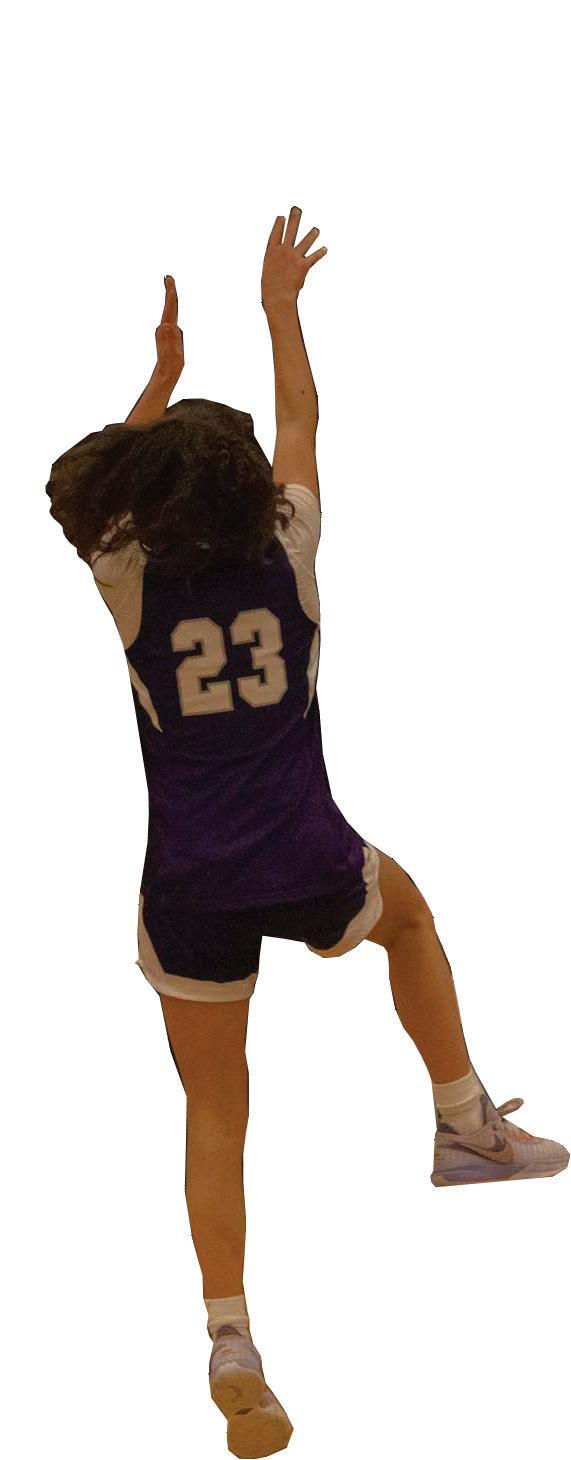
“I guess as a point guard, [my strength is] distributing the ball, being able to pass to my teammates well, and being able to see where everybody is and get other people open,” Daniello said. “I’m able to handle the ball well in a double team situation, and I can shoot from the outside very well, which helps as well if I can’t drive.”
This season Daniello has scored 22 points per game on average and more than 900 points in total. For her success on the court, she won the “Panther of the Month” title in January.
“Just the way that she can handle the ball is incredible,” the team’s coach Andrea Fischer said. “Most high school students do not have the ability to protect the ball the way that she does. As coaches, we know that when the ball is in her hands, it’s secure. And her shot is unbelievable, whether it’s an outside shot or a layup. The way that she just has a way of getting the ball into the net is incredible.”
Daniello started playing basketball at a very young age and joined her first travel team in the 4th grade. In the 8th grade, she moved up from the Masters Middle School to the Upper School girls varsity team and even contributed to the team’s victory in the NYSAIS championship that year. As she went

from being the only 8th-grader on the team to now becoming the only senior, the girls varsity team also underwent a transformation.
“When I was younger, in eighth grade, ninth grade, the juniors or seniors at that time, I mean, they went to college for basketball, and they were really great basketball players,” Daniello said. “So com -
everything in a limited period of time.
“Since we are a young team, I think some of us are sometimes afraid when we get the ball,” Daniello said, “So I think the challenge is just not being kind of robotic in a way and really trying to be in the flow of the game.”
While facing some obstacles,
I think what I really appreciate about [Daniello] is that she’s one of those kids that leads by example,” Fischer said. “So she’s always the first one to show up to practice, the last one to leave. Every drill that we do, she’s demonstrating everything. Even on a quieter side as a leader, she’s still able to lead a team through her actions. She’s able to teach both during practices as well as in games and help her teammates get to where they need to go.”
- Andrea Fischer

ing from a team that has had players who’ve been playing basketball for about as long as me to a team that is not as experienced and just a lot younger, it’s really different. The speed of the game is different; we have to stop and learn more.”
Along with Daniello, there are four juniors, one sophomore, and three freshmen playing on the team with three students being new to the varsity sport. For players coming from middle school, the challenges arise of adjusting to a different pace of the game and learning
the team also gains advantage from their young age.
“I think we as a team are kind of more hungry to win,” Daniello said. “A lot of people don’t really have as much faith in us since we’re young, so we give a lot of effort. We dive for loose balls all the time, and we try to steal it from them whenev -
her younger teammates and motivates them to improve as players.
“I think what I really appreciate about [Daniello] is that she’s one of those kids that leads by example,” Fischer said. “So she’s always the first one to show up to practice, the last one to leave. Every drill that we do, she’s demonstrating everything. Even on a quieter side as a leader, she’s still able to lead a team through her actions. She’s able to teach both during practices as well as in games and help her teammates get to where they need to go.”
Despite many of the players being new, the team has grown closer throughout the season, organizing team dinners and hanging out after practice. As a captain, Daniello puts a lot of effort into supporting her team and creating a fun and safe environment.
“Mostly my goal is to get my teammates involved and just to be a leader and lead us to be even better than last year.” Daniello said. “Before I look to shoot, maybe pass to them first, then cut to the basket and look for who’s open first, before I make a play. Other than that I try to make practice kind of fun and not daunting.”
Daniello said her biggest strength as a captain and a pointguard is her communication skills which help her coordinate the team’s efforts during the game.
“I think I communicate well on the floor, and I can read who’s on the floor and where everyone’s supposed to be and direct people,” Daniello said. “If I say to do something, or I say, next time do this, I
try to be positive about it.”
A freshman and a guard/forward on the team Zari Charles said, “Dakota really leads the team well, and whenever we are down, she’s always there to go and get a bucket. So she is really someone who is helpful and looks out for all of us.”
Daniello got noticed by the coaches in Florida Southern Col -
lege during her freshman year, and as a sophomore, she committed to play on their Division 2 team. Although not looking to play professionally after college, Daniello said she wants to win the Division championship for Florida Southern and make the most out of her basketball career in college.

16 SPORTS TOWER/FEB. 3. 2023
VIKTORIIA SOKOLENKO
“
21 points 4 assists 5 rebounds
Daniello’s Season Averages































 AlexA Murphy & lydiA ettinger
News Editor & Social Media Manager
AlexA Murphy & lydiA ettinger
News Editor & Social Media Manager





























